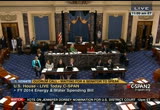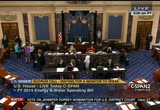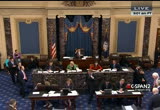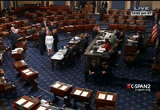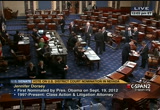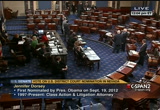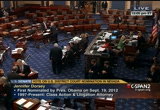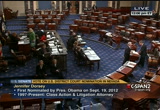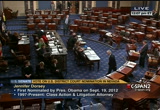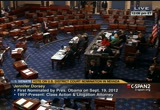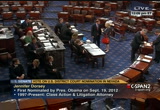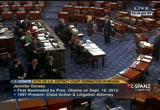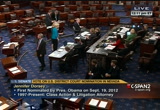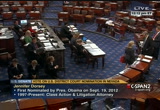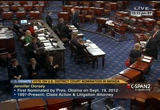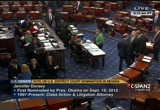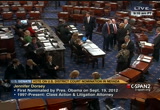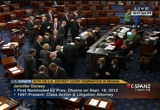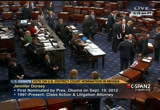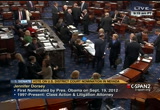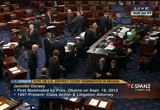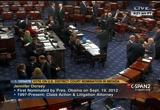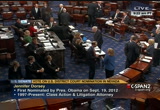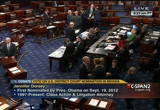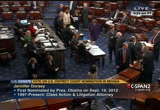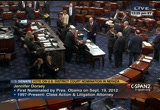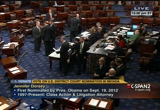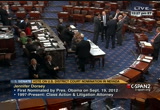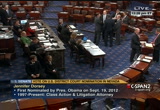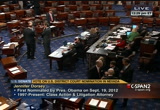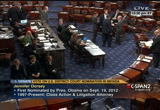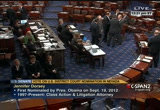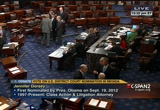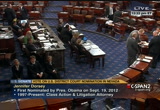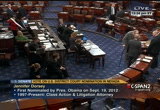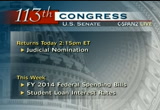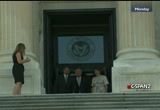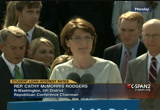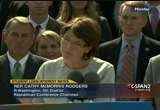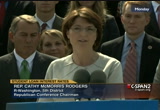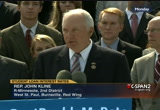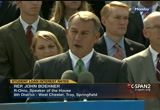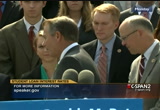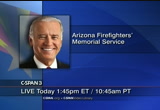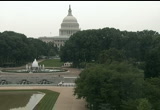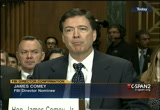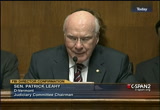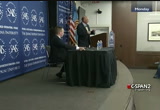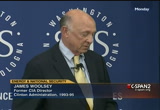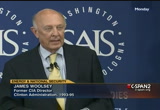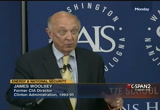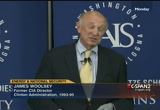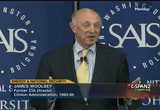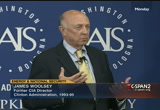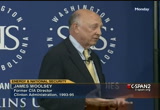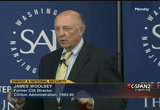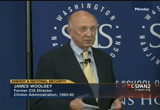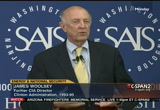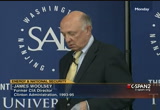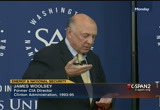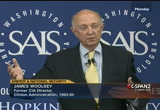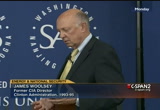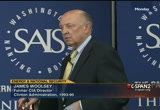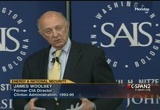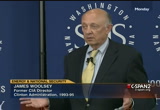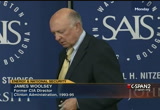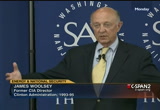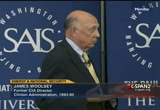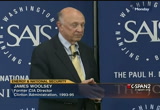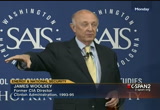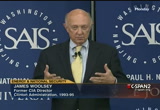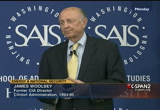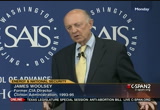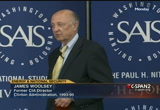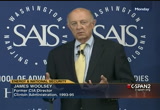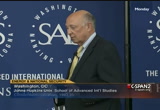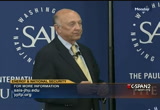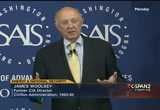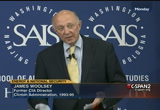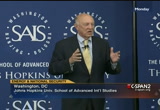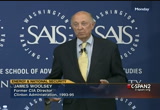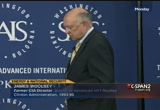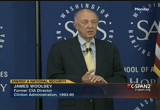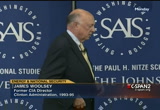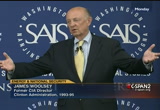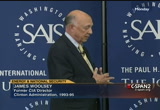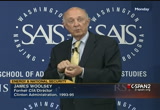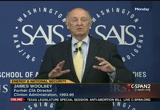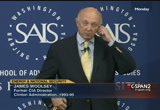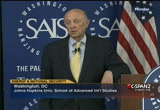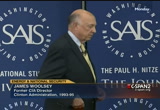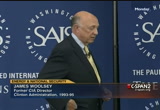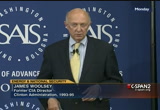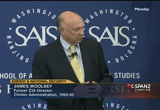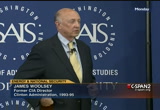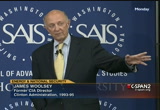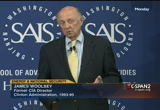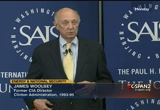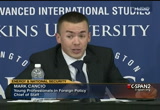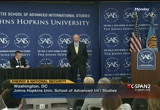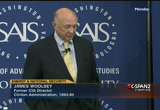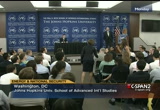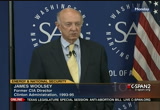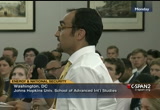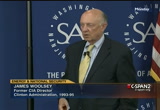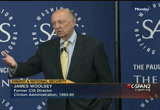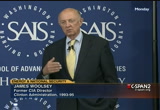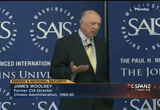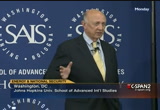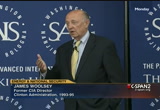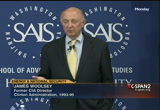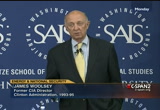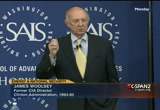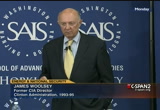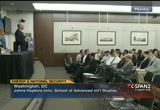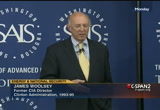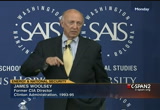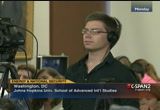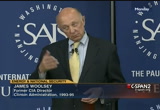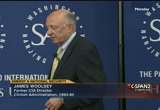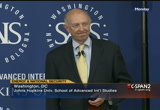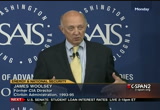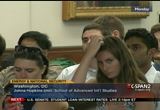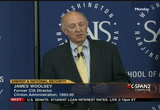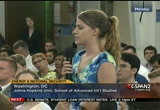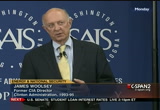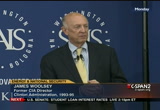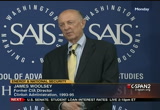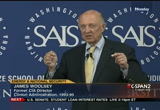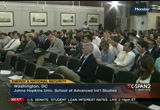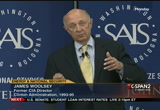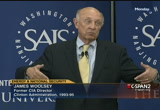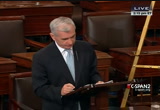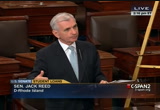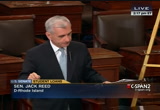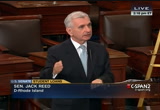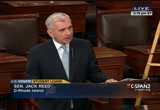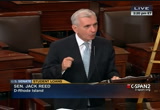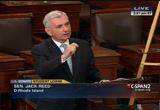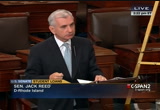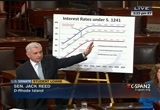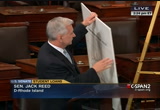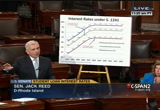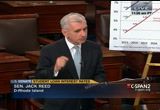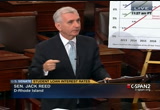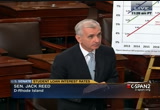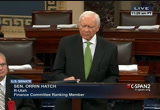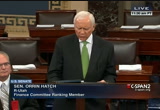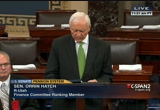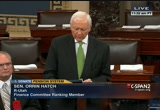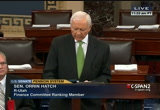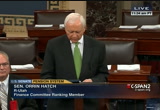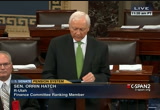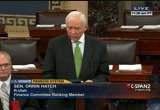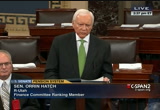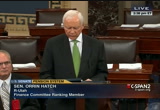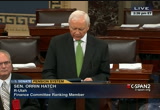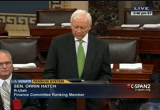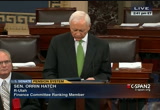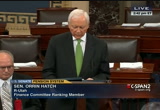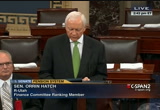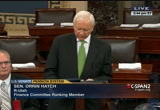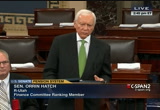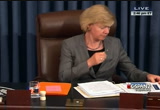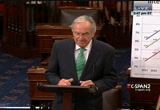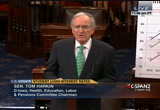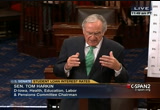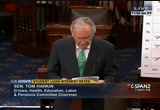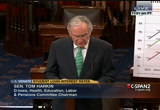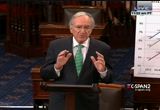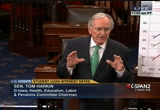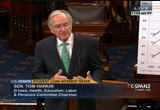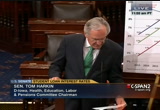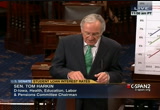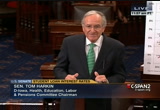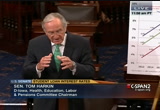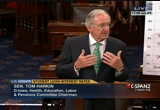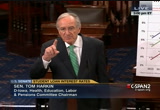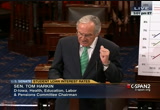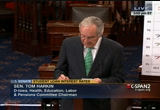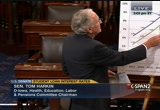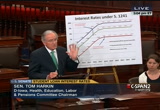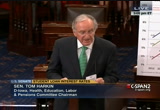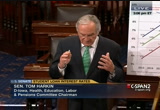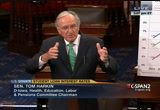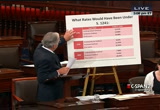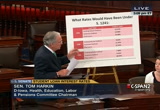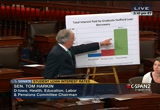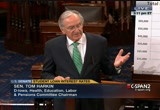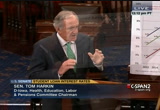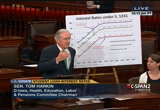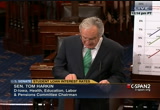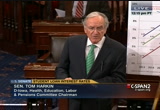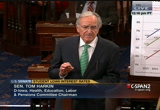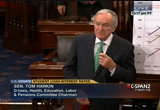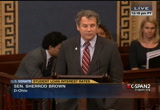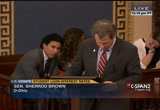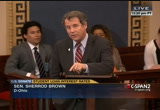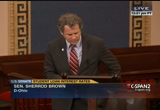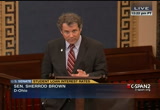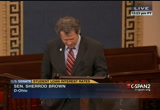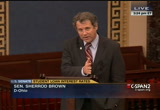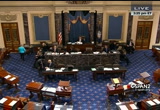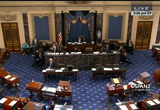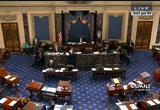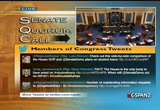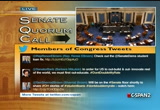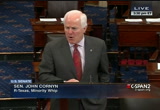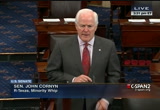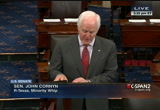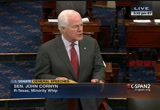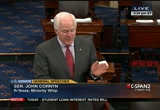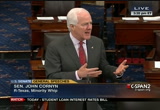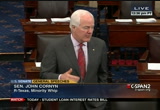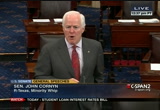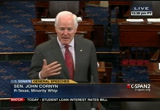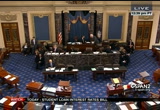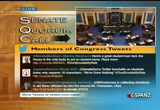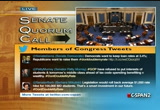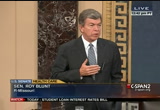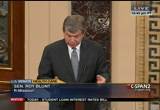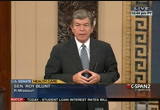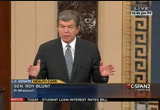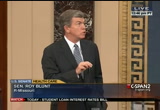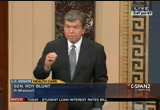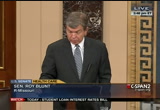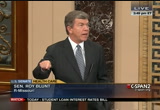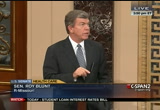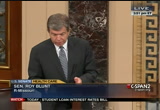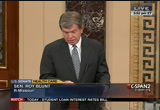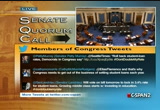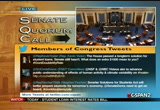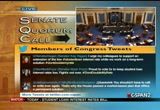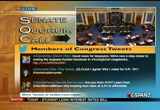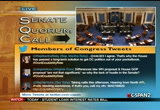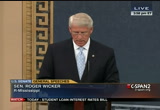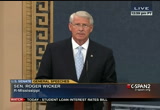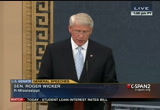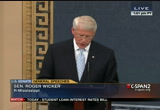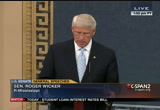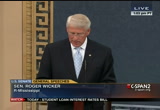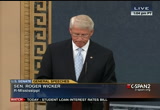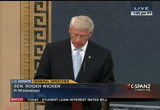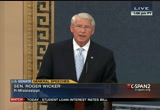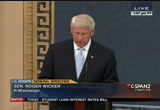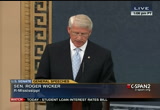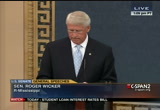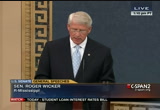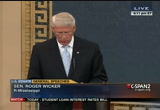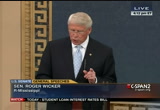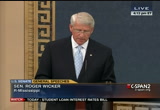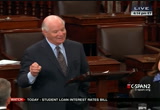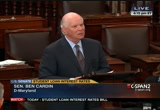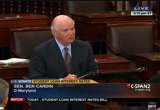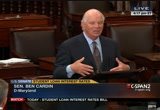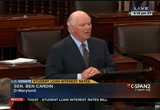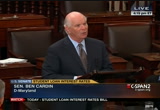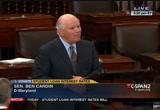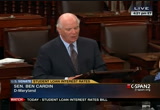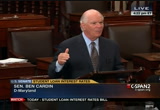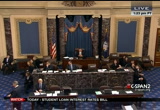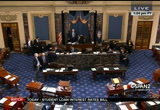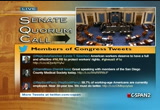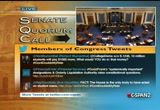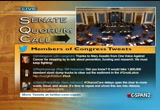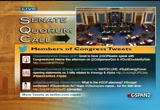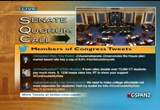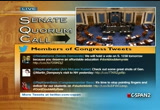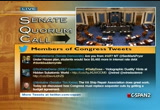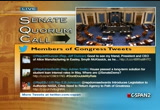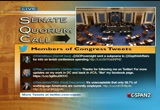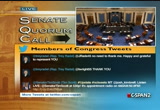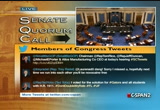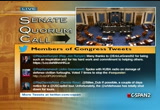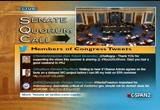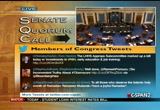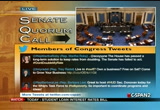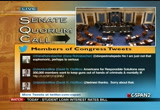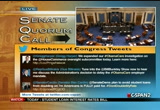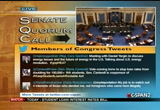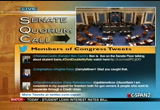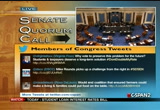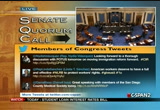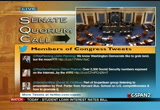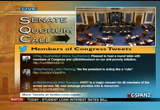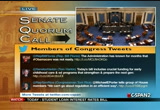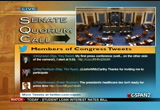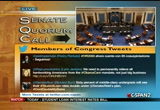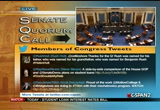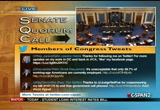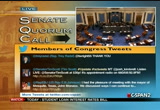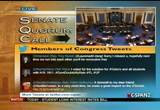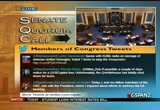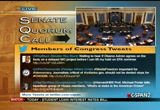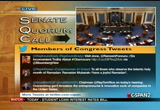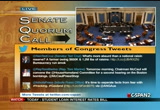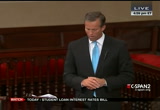tv U.S. Senate CSPAN July 9, 2013 12:00pm-5:01pm EDT
12:01 pm
a senator: mr. president? the presiding officer: the senator from north carolina. mrs. hagan: i ask that the quorum call be vitiated. the presiding officer: without objection. mrs. hagan: mr. president, i ask that the time be allocated back. the presiding officer: without objection. mrs. hagan: mr. president, i ask for the yeas and the nays to be counted. the presiding officer: is there a sufficient second? there appears to be. the question is on the dorsey nomination. the clerk will call the roll. vote:
12:34 pm
12:35 pm
nays are 51, and -- 41 and the nomination is confirmed. under the previous order, the motion to reconsider is considered made and laid on the table. the president will be immediately notified of the senate's actions and the senate will resume legislative session. under the previous order, the under the previous order, the >> the senate recessing until 2:15 eastern for weekly party lunches. before gaveling out, members voted to confirm attorney jennifer dorsey to be a u.s. district court judge in nevada. the senate continues work on legislation aimed at addressing the doubling of student loan interest rates, a vote to cut off debate on the measure is likely to occur tomorrow. the democratic proposal would restore the 3.4% interest rate
12:36 pm
on federally subsidized student loans for one year. a competing republican proposal that ties interest rates to the financial markets is also under consideration. that plan has attracted some bipartisan support and is similar to a bill passed by the house last month. watch live coverage of the senate when members return at 2:15 eastern. yesterday house republican leaders gathered on the steps of the u.s. capitol to call on the president to take action to reverse the doubling of student loan interest rates. they spoke for about ten minutes. [inaudible conversations] >> okay, you guys. they're walking out, so we've got about a minute. >> all right, jackets on, everybody that doesn't have them on already.
12:37 pm
12:38 pm
many months that on july 1st many student loans, federal student loans would double, they've been more involved in internal bickering rather than actual addressing the issue. and the students that are surrounded with us today, they're all suffering because of it. one example is a gal from eastern washington, haley homan, she's working at a local mcdonald's in eastern washington to help pay for rising tuition at washington state university. and when she heard that the loans, her federal loans may be doubling, she's an aspiring economist, maybe a public servant, she's not sure she'll be able to finish school. and unfortunately, that is repeated among many students all across this country. i was the first in by family to graduate from college and graduate school, still paying off some of those student loans myself. and i can tell you firsthand how difficult it is at times to pay
12:39 pm
those tuition rates. and it's not fair for democrats who run washington to stand in these students' way. on any given year, about 20 million students are in college, and 60% of them have to take out student loans. so when senate majority leader harry reid tells us that he's not looking for a compromise, i would encourage him to think about haley, think about these college students, think about millions of others across the country. as members of congress, we're here to make life easier for students that want to go to college, want to get an education, want to find a job. and instead we see just the opposite. we see fighting internally instead of passing a solution. i urge them to act quickly to put students first, not washington politics. >> you know, republicans have
12:40 pm
acted to stop student loans interest rates from doubling and to make college more affordable for students across the country including these students that are right here behind me. the white house and senate democrats have let these students down. frankly, i think they deserve better. it's time for the president to lead, it's time for him to bring senate democrat leaders together and develop a solution. the house has done its job. it's time for the senate and the white house to do its job. and if you look at what the house passed, it's very close to what the president offered in his own budget earlier this year. listen, the failure to lead on student loans is part of the president's larger issue, and that is the failure to lead on the biggest issues facing our country. jobs and the economy. every american deserves better than this new normal of slow economic growth, not enough jobs and no increase in wages.
12:41 pm
>> i want to be very direct. the house has acted to stop the rate from being double canned. the senate had failed to act, and now the rates have doubled. who gets hurt? the students across america. i don't care about republicans and democrats. they want to have a fighting chance for the future. so we ask harry reid, take an action. don't stop the ability for a compromise. america's looking at him, and the students most importantly are. don't punish them for his inaction. >> my colleagues have pointed out the problem. july 1st, it's behind us now, the interest rates on subsidized stafford student loans doubled. the house passed legislation to keep that from happening. to tie student loan interest rates to the market, to the ten-year treasury, to make a long-term solution and get politicians out of the business of setting the interest rate every election year.
12:42 pm
the white house with has proposed a similar solution. a bipartisan group of senators in the senate have proposed a similar solution. and yet there's no action from the senate majority leader. it is time for senate democrats to step up, take action, get a long-term solution and give these students the surety and the relief that they need. >> i'll take a couple questions. >> -- the president has been critical of senate majority leader harry reid on taking actions of this and a number of issues, what makes you think that they would be a able to lead and come together based on your criticisms of how they've addressed these issues? >> listen, the house has done its job and the fact is it's students that are going to pay the price when they see the interest rates on their loans doubling. it's time for them to act.
12:43 pm
when you have a bipartisan group in the senate who had a solution that was not far off from our solution and yet was shot down by the majority leader, you begin to wonder whether they're looking for a solution. >> with. [inaudible] do you think what's happened there was a coup, and should the united states continue its aid to egypt? >> well, i think the situation in egypt is a tenuous one. one of the most respected institutions in the country is their military. and i think their military, on behalf of the citizens, did what they had to do in terms of replacing the elected president. but anything further i think we'll wait for consultations with the administrations on how we would move ahead. >> last question. >> [inaudible] senate immigration bill that show shouldn't be holding the
12:44 pm
hastert rule, what's your response? >> i've made it clear, and i'll make it clear again, the house does not intend to take up the senate bill. the house is going to do its own job on developing an immigration bill. but it's real clear from everything that i've seen and read over the last couple of weeks that the american people expect that we'll have strong border security in place before we begin the process of legalizing and fixing our legal immigration system. and we're going to have a conversation with our members on wednesday on how we would move ahead. we have a broken immigration system. we have undocumented workers here in record numbers. we just can't turn a blind eye to this problem and think it's going to go away. it is time for congress to act, but i believe the house has its job to do, and we will do our job. thanks. >> and in the u.s. house today, members are working on an energy
12:45 pm
and water project spending bill for the next budget year. the house bill provides just over $30 billion, it's 9% less than this year and 12% less than president obama requested. the bill funds the energy department, the u.s. army corps of engineers and interior department water programs. votes in the house set for several times throughout the day. the obama administration has threatened to veto the measure in its current form citing cuts to green energy programs including a 73% cut to the office of energy efficiency and renewable energy. well, vice president biden today is in prescott, arizona, where he's attending a memorial service for the 19 firefighters who died fighting fires at the end of june on the mountainside of yarnell hill located northwest of phoenix. you can see live coverage of the entire service on our companion network, c-span3. it gets under way at around 1:45 eastern. right now at our web site, c-span.org, you can see a live
12:46 pm
feed from the floor of the texas house of representatives where members are holding a special session as texas republicans continue their efforts to pass legislation that would place further restrictions on abortions. the bill failed to pass last month in the senate after it was filibustered for 13 hours by democratic state senator wendy davis who received support from president obama via twitter. and back on capitol hill, the senate judiciary committee hearing -- held a hearing this morning for mr. comey who served as deputy attorney general during the george w. bush administration. nearly resigning in 2004 over concerns he raised about electronic surveillance orders he thought to be illegal. the administration eventually halted the program. during today's hearing committee chair patrick leahy of vermont asked mr. comey about recent revelations about collection of u.s. phone records and internet data. >> now, the surveillance powers
12:47 pm
of the fbi have grown, americans have become increasingly concerned the fbi's becoming more of a domestic surveillance agency than a crime-fighting, intelligence-gathering organization. t act, other authorities they can get vast amounts of information. including the data ofing law-abiding americans, something that raised concerns, i know, among my fellow vermonters. so do you believe the bulk b collection of metadata for domestic telephone calls or e-mails is appropriate even when the majority of individuals with whom the calls or e-mails associated are law-abiding americans? -abiding americans? >> senator, i'm not familiar with the details of the current programs. obviously, i haven't been cleared for anything like that and i've been out of government for eight years. do i know as a general matter the collection of data is a valuable tool in counterterrorism. >> let me ask you this.
12:48 pm
we're going to be in this committee very shortly reviewing again some of the aspects of this. if you're confirmed will you work with me -- i'm not asking you for a commitment on a particular piece of legislation but work with me to enact some common sense improvements to our surveillance laws? >> certainly, senator, i would be happy to work with you. >> i worry that again as i said earlier, just so you understand what i'm thinking, that just because we can do it, i'm not sure it mean we should. that's without going into the, well open session, i won't go into some of the parts of it.
12:49 pm
also i ask you this, which is a basic question. will you make sure that the fbi does not lose sight of its traditional crime fighting mission, violent crime, white collar crime, public corruption, forensics reform and not just be seduced away by the intelligence gathering aspects? >> yes, senator. >> and that confirmation hearing came to a close just a short time ago. you can see it in its entirety at our web site, c-span.org. >> saturdays in july c-span radio is airing recorded phone conversations of president nixon from camp david during the summer of '72 talking with key white house advisers about the
12:50 pm
presidential race against south dakota senator george mcgovern, the war in vietnam and watergate. the nixon tapes, saturdays at 6 p.m. eastern on c-span radio, in washington, d.c. at 90.1 fm, nationwide on xm channel 119 and streaming at c-span radio.org. >> well, former cia director james woolsey yesterday spoke about the impact u.s. dependence on foreign oil has on national security and foreign policy. he also talked about cybersecurity threats to the nation's electric grid infrastructure. hosted by the young professionals in foreign policy, we will show you as much as we can until the senate returns from their weekly party lunches at 2:15 eastern. [applause] >> thanks, mark. let's see, i think the microphones are working okay. good. i was quite honored to be asked to be with you this evening, but tell you the truth, since i
12:51 pm
spent 32 years as a washington -- 22 years as a washington lawyer and some time at the cia, i'm actually honored to be invited into any polite company for any purpose at all. [laughter] i'm going to introduce this in this evening by telling you a short story about the man whose name this building carries, paul h. nitze. paul was a absolutely remarkable individual, served in virtually every administration from the last roosevelt administration well into the time of past nixon. and he was someone that everybody wanted to have him work for them. paul had been deputy secretary of defense in the johnson administration, and in january
12:52 pm
of 1969 he was about to leave office on the 20th when everybody else would leave, and the republicans would come in. and he, his wife -- his daughter got engaged to a friend of mine from college, and so he had a big engagement party. black tie, one of the big clubs in washington, several hundred people, sit-down dinner. and there were a few of us there who were going to be in the wedding as groomsmen or bridesmaids, but mainly it was the washington establishment. finish -- i had been in my last year at yale law school the founder and president of yale citizens for eugene mccarthy for president. i was sort of for about that year, '67-'68 kind of the head of the anti-war movement at yale for the folks who weren't burning anything. and i had strong views on the war. i did not -- not strong in the
12:53 pm
sense that i was going to turn in my commission and not serve in the armed forces. i agreed to go on active duty. i was assigned to the pentagon. and this party comes up for nitze's daughter and her fiance who had been a friend of mine at stanford. so my wife and i go to the party, rented tux and so forth, and as we walk through the front door, somehow each of us holding a flute of champagne, lieutenant woolsey gets into a loud and angry argument with still-deputy secretary of defense nitze about the war. now, it wasn't so much pro and anti-war, it was more complicated than that. things were always more complicated with nitze. but it was like a young upstart challenging -- i'm retreating as he's poking at me with his champagne flute, and finally they ring the bell for dinner,
12:54 pm
and his wife comes and drags him off of me and everybody goes into dinner. as my wife and i are driving home, i said, you know, nitze and i got in a little discussion about the war before dinner. she said, yes, everybody noticed. are you out of your mind? i said, well, it doesn't matter, he's only going to be around another week or so, and then he'll be gone, and the other administration will be coming in. forget about it. well, sure enough, that's what happened. but by march, being nitze, he's back because the new team of laird and packard in the nixon administration wanted him to head up something that they thought might be interesting and important. they decided to have arms control negotiations with the soviets and the let nitze head them up for defense. my boss in the pentagon called me and asked me to come down and see him. he said, jim, you know, nitze's back. i said, yeah, i heard. he said, well, you know, what he's going to do is go over to
12:55 pm
helsinki and vienna and negotiate with the soviets about nuclear weapons, and he needs an assistant. he needs somebody to draft the speeches, do the research. you know, you're a lawyer, might be a treaty involved, would you be interested in doing that? i said, well, i can't think of anything i'd rather do as a lieutenant in the army than go over to helsinki and vienna and negotiate with the soviets, but i said i've only net nitze once, and it didn't go real well. and he smiled, and he said that must be what he moment. i said, what do you mean? he said, well, i floated your name to him, and he paused for a minute. and then he grinned, and he said, yeah, that's fine. send woolsey on up. he may not know what the hell he's talking about, but at least he'll speak up. [laughter] now, what that story says about me is that i was a brash kid. what it says about paul nitze was that he was a remarkable man in many ways. one man he was remarkable, one way i have tried to follow and one thing i would suggest to those of you going into careers
12:56 pm
in foreign affairs and the like is there are few better things in that world than having staff people or people who report to you or work with you who will level with you even if they think it makes you mad. you've got to have people who will talk back to you and level with you. i didn't have any theory of that sort at the time. i was just a brash kid. but it work withed. and it worked because paul nitze was like he was. marvelous individual. let me say a few words about our two major energy channels, and they're very different, and they operate differently, and people, i think, get the issue of energy confused by trying to lump them together more than they deserve. i'm speaking, of course, of electricity and the electric grid on the one hand and
12:57 pm
transportation fueled almost entirely by oil on the other. yes, there are other systems, there are a few electric trolleys and crews and horseback races, there are a few things that don't use oil for transportation, but almost none. and for electricity one of the stupidest things that you can hear from the press or a politician is that we have a real problem with foreign oil, so let's build a fill in the blank, nuclear power plant, solyndra, whatever. you know, back in the 1970s when we had the yom kippur war, 20% of our electricity came from burning oil. so if you, you know, built a nuclear power plant or a solar farm or something in the 1970s, you were, in fact, could well be replacing oil with something else.
12:58 pm
but today well under half a percent of our electricity comes from burning oil. almost all of it in hawaii and puerto rico because oil is transported easily, and so it tends to be used for electricity generation on islands. but today if you say that you are going to do something about improving the way we produce electricity because of the oil problem or for an oil problem, you are dealing with manager between half a percent and three-quarters of a percent of the issue. now, doesn't mean that down the road somewhere using electricity for cars is a bad idea. my wife and i have two plug-in hybrids, love the idea of using the solar panels on the roof and the batteries in the basement to charge the battery and drive on the sunlight. all wonderful, it's just that it's not going to come real fast because of how long automobiles stay in our fleet in the united
12:59 pm
states. so shouldn't get the idea that by moving toward changing the way you produce electricity your doing something particularly -- you're doing something particularly substantial with respect to oil to. these are to a first approximation separate sets of problems. what is the main problem with oil? well, again, if you -- you've got to first recognize what it's good at. it is easily transported compared to most other forms of energy, and it is, has a very substantial balance of energy in the sense of its energy content per unit of volume. so oil has some real advantages. it has some huge disadvantages. but it does have some advantages, and it's one reason it has stayed in its position of prominence for some many decades. but oil has a number of problems
1:00 pm
associated with it. they are political, they are military, they are economic, they are health. we'll talk a little bit about each one. but they create a issue that be many people think can be solved by changing the location the oil comes from. whether it's drill, baby, drill from the conservative side of the political spectrum or conserve, baby, conserve from the liberal side, there's still the idea that if more oil proto portion nately comes -- proportionately comes from us or countries that we're friendly with like, say, canada rather than, say, iran, that things will be better. the location the oil comes from is a big deal. it really isn't. the only way it's a big deal is it affects the balance of payments, and that's good.
1:01 pm
we do better with a balance of payments, we borrow approximately a billion dollars a day now to import oil. if we drill more here, we can do it in many an ecologically sound fashion, produce more here, then maybe we only have to borrow $800 to $900 million a day in order to keep going with oil. but trying to solve the fundamental issues by changing the low occasion, say buying more from canada and less from saudi arabia, that doesn't do anything. somebody else, it's one big pot of oil to a first approximation. somebody else is going to buy more from saudi arabia and less from canada. the location isn't the main point. the main point is the price. today at about $100 a barrel we are in a situation in which if
1:02 pm
oil moves another 40 or so dollars a barrel, hit 147 in the summer of 2008, if it gets back there, then approximately half the wealth in the world will be in opec, the 12 nations of the organization petroleum-exporting countries. eight of them in the middle east, two in sub-saharan africa, two in venezuela. why that huge jump? because the value of oil is calculated by proven reserves which are reserves that can be exploited at today's price. so if the price of oil goes up, not only does the oil that a country has in the ground at that point that is exploited before the price went up or can be exploited before the price went up affordably, not only does that oil increase in value, but if the price goes up, you can exploit more oil, there are
1:03 pm
more fields you can exploit, and the price goes up doubly. so oil has a characteristic of concentrating wealth very substantially. and it is not only a monopoly, it is a monopoly with a cartel nested inside of it. opec controls about 78% of the world's proven reserves of oil, and opec pumped about 30 million s a day in the early '70s at the time of the yom kippur war. it pumps about 30 million barrels today. in that intervening 40 years, the world has more or less doubled in population and much more than that increased in demand for oil and other energy. but opec is still pumping what with it pumped in -- what it pumped in the 1970s.
1:04 pm
it has 78% of the world's proven reserves of oil, but it sells on the market about a quarter of the market demand for oil every year. if you have over three-quarters of some commodity in the world and you're year after year only selling the same amount, not producing more, selling the same amount and you are doing it in such a way that you're only contributing to 25% of satisfying the need for it, there is no word for you other than cartel. you are a conspiracy in restraint of trade exactly as john d. rockefeller was. with his standard oil trust. so the economics of oil are extremely problematic for those of us who live in states like this one that have 1-2% of the
1:05 pm
world's oil rather than many tens of percent. oil has a political problem too. i would commend to you both larry diamond's book on democracy at stanford and mort halperin's book on democracy, both about three or four years old at this point. a couple of things are clear. first of all, there are 22 countries in the world -- at least there were when diamond wrote -- that produce or that depend on oil, oil and gas to some extent, mainly oil, for 60% or more of their national income. all 22 are dictatorships or autocratic kingdoms. the ten chief oil-exporting countries in the world, nine of them -- only nice norway is out
1:06 pm
of place here -- nine of them are dictatorships or autocratic kingdoms. canada's 11th. you have a situation -- well, what's going on here? why would this be? te for africant, who runs the economics at oxford is probably the main author, although there are many people who are on this approach now, of the notion of the resource curse, in particular the oil curse. the idea being that if you have control of a large amount of a commodity that has a huge amount of economic rent attached to it, then what happens to that rent is that the ruler uses it to consolidate his power, and the ruling elite gets more and more in control. doesn't mean that if you are a
1:07 pm
canada or a moreway and you discover a -- norway and you discover a lot of oil you become a dictatorship. you don't, you just get richer. but if you're already a dictatorship, things get more embedded. and that set of circumstances with respect to oil creates a very serious problem for us. when the arab spring began two, two and a half years ago, king abdullah of saudi arabia was in the hospital in new york, i think. he checked himself out right away, flew back to saudi arabia and increased the saudi budget by, i think, in the ballpark of $130 billion. where'd the money go? the money went, as collier's theory would suggest, to all those young men standing around the streets of saudi arabia who don't work. because the work force in the
1:08 pm
saudi commercial side of things is about 90% nonsaudi. why don't they? has to do with the education system and so forth, culture, who knows. but anyway, the money goes to them. they didn't riot. but they got richer. so collier's point, i think, is pretty well taken. and there's another reason that there are political problems associated with oil. mort halperin's wonderful book on democracy -- and mort, by the way, is anything but a neo-con. he's been a man of the pod rate left his ole -- moderate left his whole career. he writes very persuasively about what happens with respect to developments such as famines, guerrilla wars, civil wars and
1:09 pm
on and on when they come into a state that is highly autocratice common, and mort has the numbers in his book, in autocratic states than they are in non-autocratic states. and so we have that little problem with oil. are there any others? well, yeah, i think so. let's talk for just a second about health. when we got the lead out of oil transportation, gasoline back in the '70s, we thought we'd done something important because lead is carcinogenic, there was a big battle back in the '20s between general motors and ford about whether we were going to drive on gasoline with lead added or on, at that time,
1:10 pm
ethanol. ford supported ethanol, general motors supported leaded gasoline. people accused general motors at the time of being murdererrers because of -- murderers because of all the workers who were going to die in the factories that produced the lead. and sure enough, many did. but the thing about oil is that gasoline as it's derived from it does not naturally have a high octane rating, so as the engines got better and better even beginning with the model t and certainly today, you have to do something artificial to build up the of course take. octane. what do we do in the an sense of using alcohol fuels, either methanol with an m or ethanol, essentially, which have very high octane ratings, by the way, we use the aromatics, they're called, benzene, psi lean. when you pump gasoline, that
1:11 pm
sweet smell you smell? that's largely benzene, and that is the sweet smell of cancer. [laughter] because benzene is highly toxic in several ways, and so in order to stay with gasoline and get the octane one needs with today's cars, we have filled a substantial share of our tanks with carcinogen. well, i, i think that that might be enough to suggest that there are some reasons to think about moving off oil. and i -- well, let me mention one more. one more. i knew the late president, former president of indonesia slightly. not well. had dinner with him two or three times, and we got stuck in an airport departure lounge -- not
1:12 pm
in russia, but rather in taipei -- for a couple hours one time and talked for some time. an amazing man. his nickname, in a sense, was not only committed to religious liberty as the president of the largest muslim nation in the world, he was as hard a worker for religious liberty as it's possible to be. after he stepped down as president, one thing he did was that he recruited indonesia's leading young rock star to work with him, and they formed an organization called lib for all, liberty for all. and one of the things his organization did was he and the rock star would go around to soccer stadiums which he would rent for a night and put on free rock concerts for all the local young people, and the rock star would sing the songs that
1:13 pm
everybody knew, and then he'd sing one or two or three new ones about religious liberty, and then he'd teach the young people one of his songs about religious liberty, and then the president would come out and just for five minutes at the end of the evening, the former president of the country would tell everybody how important religious liberty was. it's hard to be much more supportive of religious liberty than he was unless you're thomas jefferson. i mean, he was a remarkable man. so when i say what i'm about to say about teaching materials, i'm not talking about indonesian islamic teaching materials. but a few years ago i was chairman of the board of freedomhouse, and we had a fine institution, the center for religious freedom headed by nina shea that is now at hudson. but in the middle part of the
1:14 pm
first decade of this century we had a group of american muslims come to us with some religious teaching materials. and they said have these translated if you want. we brought 'em to you. these were put in our mosques and spread around by saudis when they come to town. and we don't like them nearly as well as the ones that we created, but you ought to look these other. over. and we did and the center for religious freedom put out a couple of books about them that i wrote the forward to. but one part i remember is these were largely textbooks and instruction books. one was for tenth graders. i remember the chapter for tenth graders rather vividly. it had a section in it on how to kill a homosexual.
1:15 pm
you may either throw him from a high place, or you may stone him to death, or you may burn him alive to death. those were the three ways. now, if you ask the question let's say someday you're just out kind of driving around, and you realize you've got to stop by the filling station and fill up and you're thinking about some of these issues and you think, you know, i wonder how this all gets paid for, how do they pay for disseminating these books all over the world that teach people how to kill a homosexual, and then as you drive into the filling station and just before you, after you stop just before you get out to pill your car and get your credit card out, as you're asking yourself that question
1:16 pm
who pays for that, turn the rearview mirror a couple of inches so you're looking into your own eyes. now you know. no more question. now you know who pays for it. you're doing it right there at the pump. so anything we can do about this? i think there is. and i think we these to realize that the only really effective way to break a cartel is to be able to have something that people need that they can buy and substitute for the ting that is the subject -- the thing that is the subject of the cartel. now, the best example of this is the book "turning oil into salt" or annie's and my op-ed on the
1:17 pm
same subject back several years ago. salt was monopolized for thousands of years. it was the only way to preserve meat, it was the only way to preserve most food up until the mid 19th century whenning was invented -- whenning was invented. it was hugely important. roman soldiers were paid in salt, latin american countries were going to war over salt mines in the '80s. if your country had a salt mine and your neighbor did not, it was a huge matter of national strategy, prominence and wealth. then in the 1880s with the coming of the electric grid, something we'll get to in a second, people began to realize that these things called freezers and refrigerators could be produced, and it turned out not only did meat that had been
1:18 pm
frozen and thawed taste better than meat soaked in salt brine, it was a lot cheaper because salt was so expensive because it was run by a cartel. so people started buying refrigerators, and after a while salt lost its monopoly. we still use salt. we use it on the sidewalks in february, it goes nicely on corn on the cob. there are lots of uses for salt. but nobody anymore walks into a strategic situation and says the thing we've got to do is control the salt. [laughter] when you sit down to dinner this evening, i doubt if you're going to look at the salt shaker and say i wonder where that comes from. i wonder if we're salt independent. [laughter] no. unless you're long on morton's, you don't care. doesn't matter. salt's boring. the purpose of what we're talking about with oil is not to get rid of it completely, but to
1:19 pm
make it boring. how might we do that? brazilians, they've had some riots recently, and not everything is perfect in brazil, but there's one thing after four or five tries that they finally got right which was how to have competition in fuel. you pull into a fueling station, a gasoline station in brazil, and there's a pump for gasoline, and there's another one for ethanol. and you choose. and if there's been a war in the middle east recently and gas lean's really expensive -- gasoline's really expensive, people buy ethanol. if there's been a bad harvest for sugarcane and the ethanol is expensive, buy gasoline. they decide. no government bureaucracy decides, no tax system decides, nobody orders it, they just buy what they want, and it holds down the price of gasoline. it's not a perfect system, but it works better than anything else i've seen. china is moving rather te icively at -- decisively at the provincial level in 20 or so of their 27-some provinces with
1:20 pm
pilot programs and some competition in mixed fuels with 20, 30, 40% methanol with an m. the old wood alcohol as distinct from ethanol with an e, the old grain alcohol. with respect to methanol, the chinese are making it out of coal. i hope they can switch to something else before long because coal's kind of dirty for everybody. but nonetheless, they are very enthusiastic, and they did this in spite of opposition by the party and the central big chinese oil companies. what they're doing is moving toward a mixed fuel and doing a lot of it with methanol. why does this work? well, in the first place in order to take a car that is just what comes off the production line and before it goes to the
1:21 pm
showroom as the very last stage of production, to make it possible for it to use up to 85% methanol according to mit's study of about a year and a half ago, the price per car is about $90. half a seat belt. so if automobile manufacturers wanted to and were willing to make that very minor adjustment in some of the fuel lines and so forth to make it possible for the car to run on gasoline or methanol -- if you run on methanol, you can run on ethanol -- if they wanted to do that, they could. and then what would happen? well, once the pumps got installed and, yeah, you'd have to have new pumps and tanks, at least one new pump and one new tank at a filling station, but as that change occurred, people could do what brazilians do. probably, i think, in the u.s. we'd do it more with methanol with an m rather than ethanol
1:22 pm
with an e because ethanol is close to or right at gasoline's prices. but methanol, because natural gas is five times cheaper than oil today per unit of energy and methanol can be made very easily and very readily from natural gas, i think we have an opportunity to require our automobile manufacturers simply to make it possible for people to drive on any of those three fuels. ore them? -- order them? no. say there has to be a certain percentage of that purchased? no. just let people choose. same way they choose what they drink for breakfast. maybe some like coffee, system like tea, some people switch back and forth. let people decide. if we can do that, we have, i think, a very reasonable chance
1:23 pm
of creating a situation whereby according to the best numbers i've seen looks like price of oil would head down toward the range of 50-60 dollars a barrel or roughly half where it is now. if that happens, needless to say, there would be some unhappy folks in the kremlin and in riyadh and elsewhere. but in time the world's going to adjust to something like that, and those who principally import oil like us rather than principally export are going to be somewhat happier. but mainly, i think, it's going to be people not having to take that added $50 a barrel in dollar bills out of their pockets to pay for filling up their tank.
1:24 pm
well, let me say a few words about the second area of energy, electricity. i want to focus on just really one aspect of it because the combination of hydrofracturing and the improvements that are continually being made in solar, and i hope the continuance of beginning improvements in batteries, i think, are headed toward with respect to electricity more and more use of natural gas particularly to replace coal and also more use of renewables and renewables get much more useful if you can store the electricity from them and the battery improvements are starting to come. so, as well as other methods of storage. so i tend to think it's not that there's no problem with the environmental side of the way we
1:25 pm
produce electricity, and it's not that there's no other problems, it's just that the big problem as far as i'm concerned is as follows: because tesla won out over edison and we went to an alternating current grid, we need transformers, we need to step up the voltage to transmit long distances and then step it down to use it. and that works reasonably well if nothing interferes with the electric grid. but those transformers -- and there are a couple of thousand of them -- are kind of the heart of our electrical system. and our electrical system is, and i don't think this is an exaggeration, in many ways at
1:26 pm
least a major share of the heart of our is civilization. because we have got 18 critical infrastructures in the u.s -- water, sewage, food, etc. -- all 17 of the others depend on electricity. all those folks in sandy who had generators in their house and an empty gasoline can and figured they'd just walk up to the corner gasoline station and fill it up and go back and put it in their generators they'd have lights and so fort, they got up to that corner gasoline station and you know what they found out? they found out it operated on electricity, and so the pumps don't work unless they've stored fuel for a few days for a generator. but after, for almost all of them after a few days to a week or two, they're in terrible shape. so electricity is something that really requires today a very
1:27 pm
well functioning and smoothly-operating electric grid. and when it works, it's a miraculous thing. you can plug in any place and charge your cell phone and get light. it's wonderful. but let's look at some of the things that could go wrong. first of all, we did, i think, a pretty dumb thing around 19, early 1990s or into the mid 990s which was this. we had this new thing called the web. and it was cool. i mean, it still is. it's just amazing what you can do. but the spirit of the web in many ways is kind of one of sharing. what can go wrong if you share? well, little things can go wrong like even before the current flap about nsa we had back some
1:28 pm
a year or two ago a 19-year-old private first class with a thumb drive who was able to get just by walking up to it next to a computer that operated the secret version of the internet, and he was able to take hundreds of thousands of cables by american diplomats, and these were mainly state department documents. people got killed because they had told a diplomat something that he reported, and he didn't say anything about it in the country, but he was -- bad things happened. it wasn't just a matter of everybody knows everything, so that's cool. there are sometimes costs to that, and there certainly are with respect to the web and electricity. because one thing that we decided to do was since we were working at the same time on y2k
1:29 pm
and we were making a lot of changes in computers, people said, hey, let's put the control systems for the grid, for the electric grid on the web so we don't have to if you're in many baltimore and i'm here in washington and i see an outage coming, i don't have to pick up the phone and call you and say, hey, look, within the next 45 minutes we're going to need so and so how many -- no, that's the way we used to do it. that's not cool anymore. we do it all with the web. well, that's all well and good except that the web is really focused on sharing. so if you have what people increasingly call a smart web and -- or a smart grid and you think it's neat to be able to turn down your air-conditioning at home on your, from your cell phone when you're downtown, you need to think that maybe there's a teenager in shanghai doing the
1:30 pm
1:31 pm
>> to make it even a little more unpleasant, there's another way to create an electromagnetic pulse of that sort and i would be with a nuclear detonation but it does not need to be a nuclear detonation carried by weapon as any actress at all or shooting at a target on land. at a city or anything like that at all. it me don't explode when and low-earth orbit, and we now have north korea has launched one satellite and had three nuclear tests. iran had launched three satellites, and someday before too long, my hunch will be, will have a nuclear test. if you have a satellite and it have a nuclear detonation, even
1:32 pm
a very simple one, having an electromagnetic pulse generated at 100, 200, 300 miles, wherever, over an area can produce either a total or a very, very close to total destruction of a substantial share of the electricity grid. almost every choice we have made about hooking up electricity and technology has produced a dilemma. and it almost seems mundane to point out that damage to the electric grid can come from something as simple as a rifle. but i'm going to have passed out after we finished the session some clippings from local
1:33 pm
television in san jose, california, from back in april, and then some later. the bottom line is this. what i'm going to say here today will have one or two things in it that come from my discussions with people in the u.s. executive branch, none of it is classified, but the rest of it, most of everything i will say will be supported by these clippings that you will see. sometime in the wee hours of april 16, a day after the explosion in boston at the end of the marathon, something between one and four individuals showed up near san jose at and
1:34 pm
electricity station that included a number of transformers. one report says there were 20 transformers. another says it was seven, but a number of transformers. gunshots were heard a short distance away. son, but the people who have heard the gunshots were having a hard time getting a report in. and the reason we now know was that some other individuals may well have been a part of the same group had listed a 250-pound manhole cover and gone down 12 feet into a chamber where all of the wiring was for the 9/11 emergency calls.
1:35 pm
and so although some cellular images he calls got through, the land lines ones were the ones that were cut. and after an initial dispatch of several deputies to look into the matter, as they came closer they were signaled one, american get this from some of the surveillance videos, that pg&e had. as they came closer, the people who were shooting or otherwise doing what they were doing were warned by a flashing flashlight, and they left. leaving behind only empty shell casings. they had apparently been firing systematically at the transformers. one report says they were shooting at the fans on the transporters, transformers,
1:36 pm
which assisted in the cooling. others, another report doesn't emphasize they were firing at the fans. but when we put the clipping of the lines more the 9/11 some 15 minutes before together with a rifle firing at the transformers, or the fans of the transformers, or both, and signaling system and the rest, this does not look at least to me, and i think most of the people in the u.s. government are looking at it now, this does not look to me as if it was several inebriated teenagers having taken their father's hunting rifle for an escapade of some sort. it looks far more planned than
1:37 pm
that. what that suggests is that even something as available as rifles used against an important part of our electricity infrastructure, namely the transformers, could well be very dangerous. san jose, the area around it, have put on according to the press out there, added patrols and guard. these collections of transformers, some 2000 transformers the u.s. electricity grid use occur in different parts of the country and different numbers. but i come back to what happened as the electricity goes. if its body and then i -- san jose goes down but palo alto is up. one can maybe work things out.
1:38 pm
but a big section of the grid is taken out, even by something as simple as a rifle fire. we have very, very serious problems, put it mildly. because those 17 parts of our infrastructure all depend on the electric grid. i hope very much that people look objectively at this set of events outside san jose, that they make clearheaded decisions about what needs to be done. people don't need to panic but we may need to find a way to quickly put up shields around transformers and ask governors to have some extra polling by highway patrol or national guard or something. because this is not something, if these facts are correct, this
1:39 pm
is not something that is theoretical. this is not something that is possibly scientifically accomplishable. we know that decent hunting rifle can take out at least a fan, and some of them can take out the transform itself. and we need to respond to this as the sheriff of san jose, that area, has. she said in response to some public spokesman calling it vandalism, she said this is sabotage. they were trying to take the whole system down. well, the system, the silicon valley is this set of transformers. so we have some work to do. we ought to do it sensibly and clear eyed and decisively and
1:40 pm
get done what needs to get done. but we are not going to be able to do it by burying our heads in the sand, or brushing it off by saying nobody really would try something like that, that's crazy. it's crazy from the point of view of normal people, but if you're part of an ideological system or a terrorist group or anybody else, who believes their mission and their role in life is to do things like take down electric grid from the americans, then you must he dealt with in such a way as to ensure that you do not succeed. thank you. [applause]
1:41 pm
>> thank you very much, ambassador woolsey. we will go ahead and transition into our question answer period. just a couple of ground rules before we get into that. please, when i call on you we will have two staff with handheld mics. so please wait for the microphone to get to you before asking your question. they are kind of in the back of the room now milling around. when you ask your question, just due to time constraints please keep it succinct and concise. that would be appreciated. and also make sure to state your name and affiliation before you ask. also just as reminder, maybe to those that are watching on the webcast, we are liked reading this on twitter account and we're taking questions via twitter as well using hashtag woolsey. we will try to interject with some questions from the web as we continue. i guess with that we will kick
1:42 pm
this off. >> i met brian and i student here in washington. you talked about the theory and i'm just wondering if the cartel busting alternatives that are intimate and successful, what effect would that have on the regular state regime? could lead to greater instability? would it lead to a weakened government? lower quality of life for citizens, or what other alternative? >> my hunches for most of the opec countries, it would lead, and other major oil dependent exporters like russia, it would lead to at the very least a substantial depression and economic problems, and quite
1:43 pm
possibly in several other cases, violence of different types. but i look on this as deciding whether or not to lance a boil on your foot. i may, if it keeps getting worse and you don't do anything, at some point you will have to deal with it and it will hurt even more. but if you go ahead and deal with it, then you can start getting things better sooner. and i think that the eight arab countries that are part of opec, plus the two sub-saharan africa and countries, plus the two south american ones, are all dictatorships, autocratic
1:44 pm
kingdoms, and will go through some real tangles and real difficulties and real, very substantial serious problems. but if we don't do something about it, then one by one the rest of us are going to go through some pretty awful times. once half the wealth of the world is in the hands of those 12 oil exporters, what they can do to you and with us will be very unpleasant. >> hi. alisa, i'm a hopkins student also, a federal employee. you spoke briefly to cybersecurity vulnerability and
1:45 pm
the electrical grid. i'm curious if you could give us your take on cyber vulnerability to our oil industry? specifically oil rigs and pipelines. >> refineries are a special problem, because if you turn them off and one of the things you can do with cyber is turn things on and off, pretty simple for some things. if you turn a refinery off and block it for some, i don't know exactly the length of time, like a week or two or three, the catalyst goes, and then you've got to get a new catalyst and you've got to get one made. and so i don't know about the pipelines, but the refineries themselves have very substantial vulnerabilities to cyber. and i think there are probably what most cyber attackers would go after first.
1:46 pm
>> thank you, ambassador woolsey. i teach at the american university of iraq. to follow up with the first question, for the oil that the united states is not going to be importing and, therefore, is in china -- with the argument of -- given china's rise? and to follow question as well, a second question is, do you think there's any value in some of the reform bills, dodd-frank bill that requires oil companies that have present in the united states to declare their purchases from oil companies? basically introducing transparency in the oil market. will that better the political
1:47 pm
downside? >> i think it's probably okay, but i don't think the transparency does much. the problem is not that people need to understand where the oil comes from better so they can buy from one place rather than another. i think what we're going to find and the same thing sort of applies to china, is that if we succeed in getting and other fuel to compete and actually get oil down to 50, $60 a barrel, what is going to happen is that about the same amount of oil is going to be pumped as pumped now, but opec will get less forward. and it's really mainly about a transfer of funds. the oil exporters, and we've moved up into those ranks from time to time ourselves, but
1:48 pm
those who sell oil will get less for their oil because it has a competitor. and i think that, i think that's healthy for the world as a whole, i forget the exact numbers here but i think something like 30% or so of american households are single mothers. it's a substantial high number, 25, 30%. try to think of a single mother with a couple of kids trying to get into school, get them to soccer practice, go buy groceries, presumably has a job. let's take a hypothetical. get to and from work, and however much driving she has to do, she can cut down on it. every mile she drives is something that she's got to do. and for her to be 10-$12 better
1:49 pm
off after filling her gasoline tank, and she was when oil was $100 a barrel, say it's 50 or 60, rough numbers, that changes a lot. i think that, you know, something like that can be happening all over the world as people have more money in their pocket to do with what they want to do. we have unemployment problems today. we have a lot of people working part-time who want to be working full-time. and we could stand, i think, people being able to earn more and take on more without sticking a lot of it into the gosh darn fuel pump. so i think that's what is men at issue. it's not so much country versus country, or the need for transparency.
1:50 pm
>> thank you for a very informative talk. martin, georgetown university. what prevents us from using methanol as a fuel source for cars? i mean it seems like a no-brainer. >> well, i think it is. methanol is one disadvantage compared to gasoline is it has less energy density as does ethanol. so you get only about 60% of the miles per gallon from methanol that you get from gasoline. but you get much better miles per dollar. all right? because it's cheap enough and it is a pretty simple alcohol. it's clean. in an accident it would burn much more slowly than gasoline does.
1:51 pm
it has been used in the indianapolis 500 for years, mainly because the drivers see it as a safety matter. it has inherently high octane hurricane to need any benzene or any of those aromatics to go in with it. it can be made from wood chips, hence it was called with alcohol for centuries but it could be made from wood chips. it to me made from coal. they can be made from natural gas. because of how cheap gas is force and because of substantial deposits all over the u.s., i imagine it would be mainly made from natural gas here. and as i said earlier, the changes to the car according to the mit study is about $90 per car in the manufacturing process. if you take a relatively new model car that is completely you have trivia for two or three
1:52 pm
years and want to get modified to contrive a methanol, as bob in the range of 200-$300. but in any case, it's much cheaper than modifying the car to drive a natural gas. because although you can get that done in some countries for a few hundred dollars a car, it's several thousand dollars a car in the united states because we have very demanding requirements for the tightness of the fit and the type of material, and so forth. changing the family car to be able to drive on compressed natural gas or liquefied natural gas is probably prohibitively expensive. were as changing buses and trucks to drive on it makes a lot of sense because these are commercial vehicles and a change pays for itself which almost with always within a year to. so i think that there is no
1:53 pm
major reason for us to stay away from giving people the option, again not a requirement, give them the option to drive on methanol and gasoline, and they will come if you can drive on methanol come you can also drive on ethanol. it's just not ethanol is likely be more expensive. so it seems to me it's a very straightforward case. and one can either get the cars modified by having a requirement to the automobile manufacturers, or if you want to be less coercive, and even though it's only the price of half a seat belt, if you want to do it solely by persuasion and regulation, you could say well look, under the transportation act we've got the café standards, and car manufacturers fight hard for that extra little bit of weight reduction that lets them get their café
1:54 pm
requirements mileage up. why not give the automobile manufacturers a very substantial café credit, several miles per gallon, and all they have to do is say that next year half of their cars and the year after that three quarters, and the year after that all have to be able to use gasoline, ethanol and methanol. so there are several ways you can go about it, but i, i don't see any downside from people have really made series of studies of this. i would commend the set of mit studies. one on using natural gas and transportation, and another one i forget the subject. the last two, three years mits but some very fine reports out on exactly this subject. >> one from twitter right now. what would a true global natural
1:55 pm
gas market like oil mean for the u.s. and the eu, strategically? >> natural gas is a lot harder to ship than oil because you don't ship a generally, if it's liquid, then it's not at room temperature. and if it's gas, it it's in gas form, it takes up a lot of space. shipping natural gas has always been something that can be done, but it is harder and more costly than shipping oil. so oil, for many decades, they cost the same amount for a btu. british thermal unit. by the way, btu is one burn match is a btu of energy. so per btu, they have, they were
1:56 pm
the same for just track toward another for decades. now natural gas is five times cheaper than oil. and so some things that it was too expensive to do, like some types of liquid occasion, when gas and oil at the very basic level cost the same. it's now becoming possible to do because natural gas is so much cheaper and you've got more slack. generally speaking, people have stayed with oil for shipping, and then it is easier i think, much easier to establish something like a cartel for oil then it would be for natural gas to natural gas is still largely a continental matter. the russians are working pretty hard to try to make sure that nobody gets the mediterranean or
1:57 pm
western europe. nobody gets natural gas that doesn't come through a russian pipeline. they use it as an estimate of state power with respect to getting into poland, ukraine and all sorts of places. so you might see for central and western europe you might see more and more liquefied natural gas being shipped. it's expensive to liquefied it, and the terminals are kind of costly as a people have been a bit slow to move toward large volumes of lng. >> the gentleman behind the camera there. >> thank you. i'm daniel. you have described ethanol as like more expensive than methanol, but for a number of years it has been claimed that other advanced biofuels wants to come online will increase efficiency and reduce the cost
1:58 pm
of ethanol. i'm wondering right now would you emphasize more research and development into methanol production from natural gas over other advanced biofuels or do you think they should both be pursued concurrently? >> well, in 1999 back in the mesozoic era, senator richard lugar and i wrote an article for foreign affairs together called the new petroleum, which was about moving to cellulosic ethanol. and i was fairly enthusiasenthusias tic of that idea for some time. what happened was the enzymes to break down the cellulose and so forth have not really come along as fast as most people, including me, hope. and another thing is that in order to get the cellulosic biomass like, say, from a plant, a lumber mill or something, the people who were jumping on the bandwagon for cellulosic ethanol
1:59 pm
thought that since those companies pay people to take away their waste they were going to get that waste for free. will, the companies were done. once they saw that the people who ar were going to make ethanl out of that need it, they started charging for it. some of the price estimates kind of went off. and i think that brazil has a big advantage with its double growing season and its climate and the soil was just right for it and nowhere near the amazon. it's way down near são paulo. so i think outside brazil and maybe a few places that have some of those kinds of adventures it's going to be awful hard for ethanol to catch methanol. it may be close, depending on how expensive gasoline is. it may be close in some countries, including this, on an equal energy basis to gasoline. let me say one thing though about ethanol.
2:00 pm
that is i think an indirect and kind of grumpy tribute to the junk food manufacturers. because their lobby, otherwise known as the grocery manufacturers association, has done an absolutely superb job of convincing an awful lot of people that there are some serious food fuel conflicts in producing ethanol. they are, but it's a particular category of food called fat. because here's what happened. to grow the corn, and by the way, 97, 98% of our corn is an animal feed corn. so if you want to double or triple or quadruple the amount of corn that we grow for corn chowder and corn on the cob, we can do it easily. don't take any land away from
2:01 pm
anyone. it's easy. but if for the normal air of corn which is headed for an animal, if you grow the corn and harvest it and take it to an ethanol plant, then first you extract the proteins and oils, which is dried, distributed green, and is good animal feed and it's on futures markets and finance in everything and everybody agrees is a good animal feed. then you've got essentially the corn starch. and there are three things you can do with the cornstarch. one is you can turn into ethanol and drive on it, which find, like i said a little more expensive than one would like. two, you can take it to the consolidated animal feeding operations, otherwise known as
2:02 pm
skier help, where the poorest tier loses his entire life without anything being able to do anything. egm the cornstarch down his throat. it badly affects him. it's hard for them to digest. he gets six we've got to pump them full of lots of antibioti antibiotics. using the and about it that way the greats those and the linux for use by humans because immunity is built up. and the entire purpose is to great cholesterol for you and me, or as the advertising agency would say, nicely marbled beef. so if you don't want to drive on it, you can turn it into cholesterol. or the other thing you can do with it is the grocery manufacturers association i think probably has heard that only a third of american children are obese, and so they figure there's plenty of room for double-digit growth, right?
2:03 pm
[laughter] and what that means is you take the cornstarch and attorney in the fructose. who could not love does? it's about four times cheaper than dextrose or fructose. so you make a lot of money making junk food. and you get double-digit growth in obesity for american children. so it is, in fact, the case that there is a food fuel conflicts with respect to ethanol. but the subcategory of food, which the junk food manufacturers won't tell you about, which really is the alternative, is fat. >> hi. i'm called smith with the american council on renewable energy. and i feel like you're trying to get into this when you talk
2:04 pm
about solar and issues of the grid, but does the national security administration feel that distributed generation is the solution to our grateful that the? >> oh, absolutely, yeah. one of, one of the things we can do that would help a lot against at least several of the threats that i described to the electric grid is to make it possible for the grid the island and island into distributed generation into micro-grids and the rest. and the technology to do a lot of that is here or very close to being your. and it makes it a lot easier to secure the grid if increasingly you are not using a transmission and distribution. you are getting your electricity from your rooftop and storing it in the basement after it's
2:05 pm
produced. and you won't do all that at once, but even if you have, let's say, 30% of your electricity coming from the roof and stored in the basement, and you have something like a major storm or an outage, having 30% of the electricity that you would like to have, and the difference between that and having zero, is titanic. so when she began to be able to go with distributed generation, even partially, you will not be able, you're not have an aluminum plant outside have and have it running on distributed. but to be able to do exactly what you said, distributed generation, i think mainly using solar because prices have come down so much.
2:06 pm
basically distributed generation with solar looks better and better to me all the time. and the key thing that we take it from partially used a very substantial use is affordable storage. and as i said earlier, i'm not talking about great lithium-ion batteries with very substantial energy density that you can use on your tesla. but i'm talking about simple, cheap, safe batteries that can store affordable he, and those are coming. they are coming even faster than i had hoped. those will make just a great difference in our being able to have electricity when we want it and when we need it, even if a
2:07 pm
big chunk of it is still for some years coming over the grid. >> hi. my name is chelsea and i'm interning at geostrategy's. first quick question was, so you said they will make some changes in china and you said the government was against that as the oil holders, and i was wondering, first it was heading that? and also concerning emp attack's. since last year it seems like they have gained more momentum in the government. i attended a meeting maybe last week or the week before, and i know from, or at least as i understand, russia has a lot of knowledge of these attacks and i believe china does as well.
2:08 pm
and i'm assuming in my opinion as well as many other people's opinions, china probably has the most influence on north korea. so i was wondering if there's been any international dialogue on the matter? or if you know about chinese interest concerning that. >> if so i'm not aware that there's been any dialogue on emp. i think that people didn't destroy themselves to much just as long as there was a part of the chinese nuclear capability and russian nuclear capability which we have kind of liquid for a long time. although they probably would like to do a lot of things to us. neither russia or china, most of us think would like to destroy an excellent customer, particularly that the chinese have. so i think that, that emp is just starting to get some traction and discussion in the
2:09 pm
government, as you suggested. but it's not, as far as i'm aware, it's not a major subject of discussion on the international front yet. it ought to be because people ought to shield their electronics from the pulse from the sun. that's going to come at some point, and it can take out our electric grid just as much as north korean satellite with a nuclear detonation. the first question you asked, about the chinese leadership to the best thing to read on this is the book, as in petroleum and monopoly. there's a chapter towards the end, they have been spending substantial amount of time in china. there's a chapter at the end about how china get going on
2:10 pm
methanol, what happened between the central authority of the big oil companies. chinese oil companies and the local provinces and so forth. i would just sing you to his book which is terrific. >> i'm going to take one from laura on facebook. could you please address the national security implications of a north american energy community? and in particular, the opportunities and obstacles to greater energy cooperation with mexico. >> i don't know a lot about it. the reason is that i have gotten less and less energy -- convinced that location of energy generation of like fossil fuels and so forth matters much. and i think the major effort ought to go into for electricity local generations, distributed generation and storage. and for oil the effort out to be
2:11 pm
drill some oil wells if you want to. it helps to balance the payment, but it doesn't really do a great deal for us if we buy mexican oil rather than saudi. somebody else would just buy more saudi oil and less mexican. it's all kind of one pot. there are some nuances to that. the refineries and the different types of crude with sulfur content need to be rooted in certain ways. but there's a general pop -- proposition. it should really, doesn't matter that much were the oil comes from. the key thing i think in getting something into the tanks in the filling stations in a year or two rather than five, 10, 15 years that can compete with oil. at that point what will happen is about the same amount of oil would be produced, but it would be produced for less money.
2:12 pm
and i think that would be the major effect on oil producing states, whether canada, mexico, or some extent us. >> i think we have one in the back. >> hi. yes, i have one question. i'm going to simplify it. how do you, meaning the u.s. and the eu, break the oil cartel? you talk about without causing a war. because when you break the oil cartels you're talking breaking their budgets. destroying health care, et cetera. >> the eight nations of the mideast in the persian gulf and north africa aren't i think we'll likely to be able to affect us or the other countries like in europe that i would hope
2:13 pm
would join us in this area. the one country that is a major oil exporter and that we feel extremely aggrieved by the approach i suggested is russia. because oil, remember, i described it went king abdullah came home at the beginning of the arab spring. he paid certainly over $100 billion to the young men essentially in the street. that meant that that year saudi arabia needed to have a price of not just a reasonable return on $2 a barrel that it takes them, they say, to lift oil out of the ground, but they would have needed, say, 40 or $50 a barrel at least. and the amount of money they
2:14 pm
need to add to the ordinary price of oil in order to take care of their population and keep their population from demonstrating, they call a fair price. so if you hear somebody from opec or russia talk about a fair price for oil, it's kind of a pick we can term. what he means is, let's say the russians, is that although they could lift oil or, i don't know, 80, $90 a barrel. pretty expensive for them because they have a rundown infrastructure. they need to sell it for 110 because that's a fair price. what they mean is they need to buy off the chunks of their population that don't, i mean, manufacture things. russians manufactured very little except military hardware. they are good at that, but when's the last time you bought a table or at your worst over
2:15 pm
something like that, made in russia? [laughter] so they don't really have an economy, other than selling military hardware abroad, and selling natural resources, mainly oil and gas. >> you can watch this entire event at our website, we will even now to take you live to the senate floor where members are gaveling back in and we'll continue work on legislation aimed at addressing the doubling of student loan interest rates. n an effort to avert the doubling of the interest rate on need-based student loans, there is still time to act and to make things right for students. on july 1, the interest rate on subsidized stafford loans doubled from 3.4% to 6.8%. instead of allowing us to take up a vote on an extension of the lower rate, the other side continues to push a so-called long-term solution that would saddle students with even more
2:16 pm
debt in their future. students and advocates from across the country have been very clear -- on june 21, they wrote to senate leadership. in their words, a bad deal that is permanent for student borrowers is worse than no deal at all. we need time to work together to develop a good deal for students, one that is comprehensive, one that touches not upon just race but on incentives to lower costs for college education, on ways in which students can refinance their existing debt and their future debts, because as we all understand, we have reached a point where student debt has exceeded credit card debt. it's the second largest household debt, a trillion dollars in the economy. it is saddling a generation and future generations with burdens that they well might not be able to discharge. in the meantime, at this moment, we should take up and pass the keep student loans affordable act which i have offered along
2:17 pm
with senator hagan and 39 of my colleagues to ensure that students with the greatest financial need do not see the interest rates on their loans double. again, at the heart of our student lending program has been a special concern to allow young men and women with talent from low and moderate incomes to go to college. that is why we created the subsidized stafford loan program, and that is what we have to keep a focus and emphasis on today. 39 organizations, representing students, educators, colleges and universities and workers from across the country have asked us to do this. these are the students, these are the universities, these are the people who have most at stake, and they are telling us again a bad deal is worse than no deal at all. we should take a step back and remember why we offered student loans in the first place. president lyndon johnson signed the higher education act into law in 1965.
2:18 pm
he said it is a truism -- education is no longer a luxury. education in this day and age is a necessity. his words are truer today than they were in 1965. according to the university center education and work force, we will fall five million jobs short of the workers with postsecondary workers we need by 2020. we already know there will be a gap right now between the workers we need with advanced degrees and the jobs available by 2020. and so for saddling this generation with additional costs and thereby inhibiting those that may well have the talent but not the resources to go to college, we're going to create even a bigger divergence between the demand for jobs and the talented americans that can fill those jobs. nearly two-thirds of new jobs will require a college degree or similar credential. president johnson again referred to the higher education act as a promise that the nation was
2:19 pm
making to its young people for generations to come. the promise was that this nation was not going to allow financial barriers to keep willing and able young people from a college education, but today that promise is at risk. as i have indicated, the job market increasingly demands postsecondary education simply to achieve middle-class earnings. at the same time, college is getting more and more expensive. as i have said, also student loan debt is accelerating, second only to mortgage debt for american households, and this is going to have a huge impact on the overall economy of this country. it's not going to be just individual students and families struggling. the federal reserve in new york and others have reported that this debt is dragging down our economy and the young families as they try to establish themselves in our economy. the primary tool in the education act to help students pay for colleges are grants,
2:20 pm
work study and low-cost loans, the pell grant. i must say we're so proud of rhode island because it was authored and championed by our great senator, claiborne pell. but that grant is less and less able to fund a college education. in the 1960's, it was a large part of the whole tuition fee and the whole expenses fees for a year in college. today it is shrinking even as we try to extend it. and so more and more students have had to rely upon loans, and that is why we are seeing this huge explosion of debt. but today instead of aiding students with low-cost loans, the federal government ironically is reaping profits from these students. we have to change this. the congressional budget office estimates that between now and 2023, student loans will generate $184 billion in revenue for the federal government. at a time when students are struggling, when they are seeing their debts explode, we're making money off them.
2:21 pm
not investing in them but putting them under a huge financial burden. so as we sought out these complex problems, i think the most sensible and wisest thing to do is keep this subsidized loan rate at 3.4%, use the year to engage and successfully complete the complex task of looking at several different aspects of this problem. however, we are blocked from doing so because budget rules basically require us to replace the revenue. now we're able to do that in this proposal that we have made by closing a tax loophole, but we have to be able to look carefully, not only at what we will do to make it easier and more effective for students, but also how we will pay for it. now, we have to also recognize that for many years, our colleagues on the other side of the aisle have really targeted
2:22 pm
some of these subsidized loans. wanted to make them more expensive. from the contract with america in the 1990's to the ryan budget, they have suggested things, for example, of eliminating the in-school interest subsidy on student loans. for subsidized student loans, we basically -- we pay the interest while the student is in the college and pursuing their educational goals, and they suggest we eliminate that. these are some of the reasons why i think we have to be skeptical of proposals that are being advanced in order to provide relief for students. the so-called bipartisan student loan certainty act would add nearly $1 billion in additional revenues from student loans to the government coffers. it may be a short-term fix, but it creates a much larger long-term problem. the teaser rates in the first few years mask the uncapped
2:23 pm
rates students would face in the decades to follow. let me suggest this chart is very revealing. this is the undergrad stafford loan. this green line is the graduate stafford loan. and this is the plus loan for parents. as you can see, they accelerate dramatically because of the ten-year treasury bill rate that has been chosen by supporters of the other proposal and because of the likely increase in that rate. and it reached to the point -- and here, interest rate exceeds current law in 2016. by 2016, these loans will be much more expensive. this is a classic case of enjoy two or three years of low interest and be prepared to pay a lot for it in the future. it is early recommend miss ent of those proposals to refinance
2:24 pm
your house with an adjustable rate uncapped mortgage and get rid of that old-fashioned fixed rate which was so prevalent in the first decade of the 2000's which caused so much havoc and still is causing so much havoc. c.b.o. estimates that if you look from 2017-2023 alone, students will pay $37.8 billion more under the proposal of the so-called bipartisan financial relief act. now, students are smart. they can figure it out, but there is something else that we have to, i think, add to the mix. this is an estimate of the rates that was made a few weeks ago on that chart. here is the change in the daily yield for the ten-year t-note. this is the benchmark rate. you can see where it was, beginning may 1 of 2013.
2:25 pm
it has gone from about 1.6% all the way up to about 2.6%. this rate is rising dramatically. why? well, for one reason, the federal reserve has indicated that they are going to begin to taper off their quantitative easing program. one reason -- as we see signs of growth in the economy, interest rates will rise naturally. and so what we could find out is that this chart actually underestimates the potential growth in interest rate, and students could end up paying much more. in the republican proposal, there is no cap on these rates. now, they talk about the fact that it is a consolidation process, but that consolidation process can only be entered into after you have gone through school, begin repayment, accumulated interest at increasing rates each year, and then indeed when you go into the consolidation phase, all of
2:26 pm
those interest payments are capitalized, and the loan is stretched out over many years, meaning that you end up paying more, and so it is not a rate at all -- a rate cap, rather. and frankly, without a rate cap, i think we're exposing students and their families to vast uncertainty. in fact, the only thing that seems to be certain is that these rates are going up. now, we do have to approach this problem in a thoughtful way, and that's why i introduced the responsible student loans solutions act with senator durbin. it's a long-term proposal. it would base student loan interest rates on the actual costs of running the student loan programs. not on the -- a certain treasury bill rate, but the actual costs to the government, and it will protect students by capping interest rates on each of the individual loan programs. our proposal would in effect pass on the saving that the federal government accrues by
2:27 pm
the low cost of borrowing relative to other borrowers, their ability to absorb risk relative to others, and the economies of scale for loan servicing for students across this country. and additionally, by increasing this legislation, the loan limit on our subsidized loans, we will allow students of low and moderate income to receive more help and not require them to go and borrow unsubsidized loans at higher interest rates, and as a result i think help bring down this whole cascading issue of student debt. and finally, our legislation would provide relief without -- to students with outstanding loans. that's upwards of a trillion dollars, by allowing them to refinance to a lower interest rate. and these are some of the key elements for a true long-term solution. and we also need to address the cost of college. it's going up astronomically. the institutions have to have a
2:28 pm
lot more at stake. they have to be very careful that they are not only selecting well-qualified students, but they are preparing them for the work force of this century, and that they can have certainty and the student can have certainty that the skills that they master in college will be rewarded with a job in our economy. and finally, we have got to establish a true federal-state partnership. federal grants and loans can't keep pace with these rising costs. we have to work with every level of government to try to address these issues. what i would suggest is that we work together. first we extend the 3.4% interest rate. then consciously, deliberately and expeditiously, i hope, move forward to fix these issues, these complex issues, protect our students, allow education to be once again the engine that pulls the country ahead and allow every american, regardless
2:29 pm
of their wealth, to get aboard that train and go forward. with that, madam president, i would yield the -- excuse me, madam president. madam president, i have a unanimous consent. i ask unanimous consent that senators be permitted to speak for up to ten minutes each and that senator hatch be permitted to speak for up to 15 minutes. the presiding officer: is there objection? without objection. mr. hatch: madam president? the presiding officer: the senator from utah. mr. hatch: madam president, i rise to speak about the pension reform legislation i am introducing today. i am taking this step for a simple reason -- america cannot keep sleep walking into the financial disaster that awaits us if we do not get the public pension debt crisis under control. the bill i dues today is so-called the secure annuities for employment retirement act of 2013. the safe retirement act for short. in addition to public pension
2:30 pm
under funding, the safe retirement act addresses two other critical -- critically important aspects of retirement policy -- 401-k plan coverage and access to professional investment advice for workers and retirees. i will briefly address each part in turn. i have been working on the public pension underfunding problem which i call the pension debt crisis for some time. two years ago i stood before this -- this senate and described the financial challenge public pension plans pose to americans. i described how the gap between the pensions that have been promised to workers by state and local governments and the money set aside was as much as $4.4 trillion short by some estimates, more than the total amount of municipal bond debt nationwide. i explained that the problem of public pension underfunding exifsed before the 2008
2:31 pm
recession and any attempt to lay blame for the problem at the feet of wall street or big business or some other group was just plain blame shifting. i observed how the business world long ago recognized that traditional pension plans defined benefit plans, had become unsustainable for most private companies and that most had moved toward 401(k) style plans or -- and defined contribution plans because costs are lower and more predictable. they fit well with an increasingly mobile and dynamic work force. as you are, governments have -- as usual, governments have been slow to innovate, slow to adapt and when they have acted their actions have been too limited to solve the problem. i said at the time i had not settled on the best solution but was working hard and talking to the experts about the best way to proceed and that is what we did. last year i delivered a report
2:32 pm
about the public pension debt problem titled "state and local government defined benefit plans, the pension debt crisis that threatens america"-- unquote. the study showed that public pension underfunding is a long-standing problem and that the current pension debt crisis goes back more than a decade if not further. the report explained why public pension detective is a federal concern, reviewed previous federal attempts at legislation and more recent state legislative measures focused almost exclusively on new employees and the attempt by the government accounting standards board to restore a level of discipline to public pension accounting. at the end of the record report i laid out four essential goals. first, public pension plans must be affordable for public employers and taxpayers.
2:33 pm
second, plans must be structured so taxpayers in the future have no liability for past years of employee service. third, public plans should provide retirement income security for employees. and finally, fourth, a federal bailout of the states must be avoided at all costs. as you will see i listened to people on all sides of the gaitd including employee groups who want lifetime income, that could have merely recommended that state and local governments move to a 401(k) style plan but i settled instead on a policy of trying to achieve retirement income security as well. madam president, despite numerous legislative initiatives enacted at the stlofl level, the public pension debt crisis has gotten worse, not better. in my report i warned that examples like pritchard, alabama, val hey hoe --,
2:34 pm
vallejo, california were only the fing beginning. sadly, i was right. since that time we have witnessed the pension debt crisis descend on much larger cities like san jose, california, stockton, california, san bernardino, california, and detroit, michigan. does anyone doubt that a state could be next? how many times does the credit rating of illinois have to be downgraded before we act? how long can rhode island hold out when it is expected to save the strumming cities while it struggles with its own pension crisis? the problem is getting more serious every day and the four goals i've outlined in my report cannot be reached merely by fine tuning the existing structures available to public employers. the new public pension design is needed. one that provides cost certainty for is state and local employers, and does not include
2:35 pm
an explicit or implicit government guarantee. i'm pleased to say i believe i've designed such a plan. the safe requirement plan act requires a -- creates a new pension plan called an annuity accumulation retirement plan. i call it the safe retirement plan. the concept of the safe retirement plan is simple. take advantage of the lifetime income that fixed annuities can provide while mitigating the volatile effect of interest rates on pension levels by purchasing an annuity contract for each worker every year during their career so that a worker builds a solid pension year on year -- or year by year during their entire working life. with a safe retirement plan, employees receive a secure pension of retirement for life that is 100% vested, fully portable, and cannot be underfunded.
2:36 pm
employers and taxpayers receive stable, predictable and affordable pension costs. underfunding is not possible. the life insurance industry pays the pensions and bears all of the investment risk. unlike current public pension plans, the safe retirement plan will be protected by a robust and multifaceted state insurance regulatory system built to ensure financial strength and solve enzi and backed up by a state law-based consumer safety net. rather than impairing their pension plans states that adopt the safe retirement plan will be upgrading their pension plans. remember, there is no pension benefit guarantee corporation backing up state and local pension plans and there never will be. corporations that sponsor pension plans pay premiums to the pbgc and their workers and retirees receive a level of insurance in the event the plan does not have assets sufficient
2:37 pm
to pay promised benefits. state and local workers enjoy no such protection. so another solution is needed. the safe retirement plan in my opinion is the answer. it is supported by well-regulated, highly solvent state insurance system and has a built-in financial backstop that doesn't rely on state or federal taxes. regard heless of which side of the debate you've been on to date, you must recognize that from a solvency per perspectives is a will big improvement. some will argue that will give too much business to the life insurance industry. that's not how i look at it. the way i see it my bill takes advantage of the life insurance industry to help americans solve a serious pension program. after all, the life insurance industry is the only industry in the world designed from the ground up to manage longevity
2:38 pm
risk. annuity contracts purchased through a safe retirement plan will be competitively bid upon on a group contract basis so that the workers receive the highest possible pension in retirement. government finance officers will be involved in the bidding process to ensure best practices and life insurance companies will be supervised by their respective state insurance departments. the life insurance industry is reliably sol vent because state insurance regulations are strict with stringent reserve requirements and conservative investment standards. in fact, state licensed life insurance carriers survived the 2008 stock market meltdown in far better part than any other part of the financial sector. the status quo is no longer acceptable. maintaining the status quo comes with a very high cost. in 2011, s&p downgraded the
2:39 pm
united states in part because of the enormous debt representatived by underfunded state and local pension plans. the credit rating agencies have downgraded illinois multiple times and moody's has been scrutinizing obligations more closely. what will happen when the credit rating agencies see that most state and local governments have no serious plan to address the crisis? a pension is insurance against outliving the money you have available to pay your monthly bills. it cannot be denied that people are living longer. and as wonderful as that is, it means we need to find new ways to stretch our monthly pension dollars over longer lifetimes. the safe retirement plan can meet the test. in addition to public pension reform, title 2 of the legislation i introduce today has several important private pension reforms.
2:40 pm
the centerpiece is the starter 401(k). a new type of 401(k) plan that allows employees to save for retirement while placing minimal burdens on employers. starter 401(k) plans allow employees to save up to $8,000 each year but do not require employer contributions. this plan will be especially useful to small companies that don't have a retirement plan and start-up companies that must devote all of their resources to building their businesses in the early years. the finance committee has received evidence in hearings that access to a retirement plan at work is the best way to ensure that individuals save for retirement. the policy goal of congress, therefore, should be to encourage employers to establish and maintain a workplace retirement plan. the corollary is that congress should not adopt policies that discourage employers from maintaining a retirement plan.
2:41 pm
the starter 401(k) is a winner on all counts. it is targeted at businesses that don't already have plan for their employees. it allows employers to help employees save their own money in amounts greater than they could on their own. and it has none of the expensive and burdensome testing and contribution obligations for employers associated with other retirement plans. it's one of the -- as one of the many supporters told me, the starter 401(k) is an idea whose time has come, unquote. in addition to the starter 401(k), the private pension reforms i introduced today will help employers by simplifying reporting rules, easing discrimination testing safe harbor rules, allowing modernized electronic disclosure options and encouraging the provision of lifetime income options for employees. these are commonsense and long overdue reforms to our nation's retirement savings laws.
2:42 pm
especially with regard to small and mid-sized employers. last but not least, title 3 of the legislation i introduced today will ensure that retirees continue to have affordable access to professional investment advice. madam president, the acting secretary of labor is set to rewrite a 1975 regulation and dramatically expand the erisa fiduciary duty and prohibitive transaction rules applicable to 401(k) plans. the acting secretary also intends to apply the new and restrictive rules which will cause investment advisors to stop providing advice to many i.r.a. owners. i have win wherein to the secretary about the issues but my concerns not have been addressed. there have been a number of learts from both sides of the aisle imploring the department of labor to reconsider ther wans of the expansive and burdensome
2:43 pm
regulations. 40 members of congress have written the labor secretary just since february to no avail. in light of the d.o.l.'s or department of labor's intransigence, my bill includes a legislative solution to the problem. the i.r.a. prohibited rules are codified solely in the internal revenue service code and address transactions that address self-dealing and conflicts of interest. prior to the issuance of a 1978 executive order, treasury had jurisdiction over the i.r.a. rules. the 1978 order transferred treasury's jurisdiction to the d.o.l. the safe retirement act restores jurisdiction for i.r.a. prohibited transaction rules to the treasury department. in addition, the treasury will be required to consult with the securities and exchange commission when prescribing
2:44 pm
rules describing the standard of care to brokers to i.r.a. own pemplets the 1978 executive order also transferred to the d.o.l. some of the treasury department's joint jurisdiction over the prohibited rules applicable to retirement plans. the about the bill i inthiewfd today restores joint jurisdiction to treasury and the d.o.l. joint jurisdiction makes sense in light of the d.o.l. proposal to expand the 1975 regulation because treasury must enforce prohibited transactions through excise taxes. treasury should have a role to play in any expansion of the rules because expanded rules will mean more excise tax cases for the i.r.s. to process. if the acting secretary of labor believes that the 1975 fiduciary regulation that has governed retirement investment advice for nearly four decades should be revisited, then the 1978 decision to grant the secretary
2:45 pm
of labor additional erisa regulatory authority also should be revisited. after all, we don't know that the d.o.l. would have been granted additional authority in 1978 if the sensible 1975 regulation had not been issued. madam president, make no mistake, the position i take today regarding i.r.a. investment advice is not a partisan position. in the last congress, 124 members from both sides of the aisle and from both chambers including 75 democrats i might add, wrote to the labor secretary asking her not to take this course of action. the secretary finally withdrew the proposal last year, but now that the acting secretary is again threatening to introduce this ill-conceived rule, dozens of members of congress have begun writing the secretary asking that the i.r.a.'s be protected.
2:46 pm
madam president, i ask that i be able to complete my remarks. the presiding officer: without objection. mr. hatch: madam president, i would like to submit for the record two letters written in march and june of this year by a total of 40 members of the house democratic caucus, once again asking the d.o.l. to avoid the mistake it's about to make. the presiding officer: without objection. mr. hatch: madam president, these letters are proof positive that opposition to the labor department's fishery -- fiduciary regulation continues to be both bipartisan and bicameral. as i close, madam president, i also want to place in the record copies of many letters of supportive received for the safe retirement act of 2013, if i can. the presiding officer: is there objection? without objection. mr. hatch: the letters come from businesses and organizations representing employers, life insurance companies, state insurance commissioners, state guaranty associations and tax policy groups.
2:47 pm
these letters demonstrate that the safe retirement act is good policy and will make good law. america's retirement system deserves no less. and i want to thank you, madam president, and also my colleague on the other side. i yield the floor. a senator: madam president? the presiding officer: the senator from iowa. mr. harkin: madam president, i take the floor here today to follow up on what my good friend, my colleague, senator reed, from rhode island just spoke about, and that is the looming interest rate hike on student loans that's confronting us in this country. now, to recap just a little bit, in 2002, the congress passed a fixed rate. we had had variable rates before, but they passed a fixed
2:48 pm
rate on student loans of 6.8%. in 2007, i believe, it was lowered to -- no, 2009, it was lowered -- yes, 2007, it was lowered to 3.4%, and that lasted for about four years, and then it was going to go back up to the fixed rate of 6.8% last year. the congress passed a one-year extension of that 3.4%, and it's that one-year extension that expired on july 1 of this year. so if the congress does nothing, the interest rates go back up to 6.8%. now, in the midst of all this, a lot of ideas have been floating around about what to do on student loans and the interest rates. well, i think we have to keep in mind that if we go from 3.4% to 6.8%, that's a doubling. more than 7.2 million college
2:49 pm
students will be required to pay an average of $1,000 more in interest per loan if we let it go back to 6.8%. now, again, that's real money for our nation's students. student loan debt currently exceeds a trillion dollars. this is second only to mortgage debt in the united states. higher than credit card debt. the average student now graduates with more than $26,000 in student loans. so now is really not the time to make them pay even more. so now luckily we do have, again, a window of time to act before the doubling causes any real harm. it doubled on july 1, but we had the fourth of july week, so if we were to again extend the 3.4% for another year, it would do no harm. we would do no harm to anyone, and that's why i am urging my colleagues to support s. 1238, the coupe student loans
2:50 pm
affordable act of 2013. this responsible fully paid for legislation introduced with senator reed, of course, of rhode island, senator hagan, senator franken, myself and many others, it's a viable solution to keep student loan rates affordable for our middle-class students and families struggling to afford college. i might add, madam president, this bill is supported by 49 student youth consumer, civil rights and education organizations across the country, and here is a letter that they sent to leader reid and senator mcconnell, dated june 28, to support s. 1238. they said we applaud this bill which creates a workable solution to maintain current low rates while congress seeks to reauthorize the higher education act, to reach a comprehensive solution to the student loan crisis that is good for students. we expect a vote on s. 1238 on
2:51 pm
july 10, 2013, allowing the proposal to take effect in time to protect incoming and returning students as follows, and that is what's happening tomorrow. tomorrow we will vote on cloture on this bill, cloture. so that then we can get an up-or-down vote on whether or not we are going to extend the 3.4% interest rates until next july. and i will in a moment say why that's so important. many of the other -- the letter goes on that says many of the other proposals being discussed would result in even higher cost to students than if interest rates were simply allowed to double, that is to go to 6.8%. the bipartisan student loan certainty act put forth by senators manchin, burr, coburn, alexander, king and carper, would drive up borrower costs by $1 billion and tie interest rates to the market without a cap to protect students.
2:52 pm
this proposal would pay down the deficit on the backs of students, trading national debt for student debt. trading national debt for student debt. it is unacceptable, the letter goes on, to use student loans as a vehicle for deficit reduction, especially when the federal government is projected to make $51 billion on student loans just this year. so that will be the vote tomorrow. and, madam president, i ask consent that this letter, along with the list of the organizations supporting the one-year extension, appear at this point in the record. the presiding officer: without objection. mr. harkin: so that's -- that's really the vote tomorrow. are we going to keep 3.4% or are we going to allow it to double? that's the essence of the vote tomorrow. now, there is a lot of different ideas floating around about what to do, how to do this, but in just about every single case, every one of those bills, if you
2:53 pm
project out over the next couple of three years, will raise interest rates higher than 6.8%. so again, that's why extending it for one year is so important. the proper place to address this issue is in the reauthorization of the higher education act. that expires this year. our committee will be having hearings on this. we have had some already. we're going to have more this fall. we expect to be able to put together a reauthorization bill early next year, and this is where this -- this is where it belongs. this is where the student loan thing belongs in the higher education act, and here is why. college affordability is more than just what your loans are costing you. college affordability also has to do with what are the tuitions being charged by colleges? why are the tuitions where they are? it also has to do with the lack
2:54 pm
of transparency from one college to another. what do coarses here cost, what do coarses there cost? what's built in to that cost her course hour, per study hour at this college compared to this other college? there is a lot of other things that go into college affordability other than just the cost of a student loan. so to separate out a student loan and treat it as some kind of a separate entity is to kind of ignore all the other things that affect the cost of college education, and that's why it really needs to be a part of a comprehensive solution, including pell grants. maybe we want to change some of the structure of pell grants. maybe we want to take a look at exactly what it is that -- that we as a society want to do in terms of making college more affordable, what kind of
2:55 pm
interest rate base do we want. do we want a 91-day t-bill rate which we have had since 1958, or as others are proposing now go to a ten-year bill rate? what does that mean? that's never been fully flushed out. that only comes out through hearings conducted by the committee, by our committee. or should it be based on a three-month treasury note? there is all kinds of different ideas floating around, and no one really knows what is the best solution. now, i have pointed out the necessity for a cap on these loans, and i -- you know, i think about my own experience. when i started college in 1958, there wasn't such a program, but in 1959 and after that, we had what was called the eisenhower
2:56 pm
loan program. it was called the national defense education act. i went to a window at iowa state university, and i borrowed money. and i borrowed money at 2%, 2%. and the interest rate -- i looked up, the interest rate during that period of time -- the ten-year treasury note at that time in 1959, 4.4%, 4.12%, 3.88%, 3.95%, all the years i was in college, yet i borrowed money at 2%. so our government, our representatives decided that it was worth it for america to subsidize the loan that i had, not charging the ten-year treasury note but actually half of that, almost half of that. think about that. not only did our society, our government say that we want to
2:57 pm
have a fixed rate of 2%, no matter what the market rate is, all the time i was in college, when i was a sophomore, junior, senior, there was no interest charges. the interest rate clock did not run. well, then i went in the military for five years. the five years i spent in the military, no interest rate clock. i then got out of the military, went to law school. three years in law school. no interest rate clocked. then after i got out of law school, i had a one-year grace period of no interest rate. so you add it up, five, eight, nine, ten, 11, almost 10-12 years that i had no interest rate charges, not until after i was out of law school for a year did the interest rate clock start to run, and then i could pay back the loans. that's what our society, our government, our people decided to do for me and for students of
2:58 pm
our generation in the late 1950's and 1960's and 1970's. that's what they decided to do. and so now we hear now we have to go to a market rate. we have to go to a treasury note of ten years plus something. i only talk about this just to show the contrast between what our country was willing to do for students of my generation and what we're trying to do for students of this generation. we're going to sock them with higher interest rates. that's why student debt is so high. that's why it exceeds credit card debt in this country, because we got away from understanding that that subsidized rate was an investment in the future of our country. it was an investment in getting kids through college and not putting a mountain of debt on their heads, so when they got out, they could get married, raise families, start to make
2:59 pm
money and buy good consumer items like cars and homes and all kinds of things, rather than paying back their debts for the next 10-20 years. so we have gotten away from that. and these are the kind of things that we have to think about as we reauthorize the higher education act. what is it that we're willing to do to invest in this new generation of students in terms of getting them an affordable college education? now, in moving forward, i appreciate the efforts of others who have come forward with ideas, but there is still a divide here, and here is the divide. those of us i think in our caucus, in the democratic caucus, have said we have two key principles that we want to uphold. any deal on interest rates should not reduce the deficit on the backs of students. we should not trade national debt for student debt. and number two, we need to keep
3:00 pm
in place an interest rate cap, an interest rate cap as a key consumer protection to shield students from exorbitant rates in the future. now, i have the highest respect for our president. i served with him here. he was on our committee. i only wish that perhaps they had talked to us a little bit before they came out with their proposal. president obama came out with a proposal on student loans. the first president since 1958, first president, not democratic president, first president, democrat or republican, to propose going from a 91 t-bill date to a ten-year treasury note. no other president suggested that. secondly, no president since 1958, no president, has advocated removing the cap. president obama in his proposal proposed removing the cap.
3:01 pm
well, i believe it's safe to say that our caucus said no, we're not going to do that. we're not going to lift this key consumer protection of having an interest rate cap. and -- and if we're going to go to a ten-year treasury note, then what is it that we do? do we do it like they did it for me where they subsidize it below it? do we add something on to it and how much do we add onto it? so, again, we have, as i said, we have two key items. interest rates should be reduce the deficit on the backs of students, and we need to keep in place an interest rate cap as a key consumer protection. now, i might point out that this has happened before. we had an interest rate cap in
3:02 pm
the 1990's when we had a variable rate. the cap was at 8.25%. five times in the 1990's interest rates went above that. the cap protected students. five times. that's why the bill that has been put on by the republican side, s. 1241, fails to meet both those principles. the bill like the house goop g.o.p. bill and s. 1003 is worse for students over the long term than if we let rates just double. s. 1241 would raise nearly a billion dollars by charging students higher interest rates over ten years using that revenue for deficit reduction. and this bill looks an interest rate cap, an essential protection for students as i said that's been in place since 1958.
3:03 pm
now, according to the c.b.o. projections of the ten-year treasury note -- that's what we have to live with are c.b.o. projections -- under their proposal, this proposal of s. 1241, i think senator alexander and others have come forward with, graduate students rely on stafford and plus loans will see higher interest rates starting in 2016, right here. so what you get is -- i saw a card put out that said under this bill that the graduate student loans would be 5.21%. that's true here. then it goes up in 2014 and 2015 and then in 2016 it goes above the fixed rate of 6.8% and keeps going up to 8.6% from then on. so students, understand this, they looked at it and said this is like bait and switch.
3:04 pm
a couple three years where they're lower and then from then on everything is higher for us. they said we don't want that. we don't want that. and by 2018 on the undergraduate loans, that's the subsidized and unbe 1eubd islands loans it's 7.1% so it's even more than the 6.8% that is in permanent law. so again i repeat, we've always had an interest rate cap for as long as we've had student loans we've had a interest rate cap. for as long as it's existed, even when we had a variable interest rate in the -- from 1992 to 2006, as i pointed out, five times we bumped up against that cap. so students were protected. now, i've read that s. 1241, the authors say there is a cap. does this plan have a cap? it says yes.
3:05 pm
well, there's a consolidation cap which we already have in law, by the way. we already have a consolidation cap in law. they just keep it. but a consolidation cap is not a substitute for an interest rate cap. it's apples and oranges. one is a repayment mechanism, that's a consolidation cap, the other is a consumer protection, called an interest rate cap. so a consolidation cap is not a real cap. look at it this way: let's say that interest rates go to 10%. 11%, 12%. not unheard of. we've had it in the recent past. so a student is in college, that student takes out loans at 10% or 11% or 12%, when they're a freshman, sophomore, junior, seniors. during the time they're in school interest is accruing on their loan at 10% or 11% or 12%. they can't consolidate until
3:06 pm
after they graduate. so then they say, well, they say, well, you can consolidate it at 8.25% which is where it is right now, by the way, or they can consolidate all their loans n interest rate that's equal to 8.25% or the weighted interest rate of their loans. whichever is lower. well, again, that all sounds good. but then you have to think about consolidation. consolidation. consolidation. i pointed out that under 1241, the republicans' bill, that if you took out a basic loan under their -- under the basic program we have now for ten years, at the maximum, that under present law you would pay back about in payments.
3:07 pm
under 1241 you'd pay back $28,000. so $7,000 more. get this -- the same loan under consolidation you'd pay back $69,000. so consolidation -- that's why a lot of students aren't consolidating because they know that they're going to pay a lot more in interest charges for a longer period of time. think about it like a 15-year mortgage versus a 30-year mortgage on your house. so maybe a student would say, well, okay i'll consolidate, my monthly payments will be lower but the total amount i pay back will be three, four, five times more than what it would be if i don't consolidate. so consolidation may be useful to some students as a repayment mechanism but it's not the same as a cap. on interest rates. it's not the same as a cap on
3:08 pm
interest rates. the bottom line is that an interest rate cap is the only way to ensure that all borrowers are shielded from exorbitant rates in the future and consolidation is simply not a substitute. now, let's take a look at the base rate in 1241, the ten-year treasury note. i asked my staff to go back and find out, take the provisions of the alexander bill, the 1241, and let's go back in time. what would students have been paying in interest rates? in interest rates. so i looked at 1980, 1990, 2000, every ten years. and under s. 1241, underare graduate stafford, 13.31%,
3:09 pm
14.86, 15836. 1990, 10.4%, 11.9%, graferred stafford, 9.4 %, plus loans 10.43%. all of those above the 6.8% that is permanent law right now. permanent law. and -- in every single case. because there's no cap, since there's no cap and we have seen in the past ten-year treasury notes as high as 14%. as high as 14%. so there's no cap, so you take the ten-year treasury note plus 1.85% or 2% and you can see where students without a cap are going to be paying a lot more money. the ten-year treasury note is already on the rise as the economy gets stronger, we know those interest rates are going up and that's what c.b.o. tells us.
3:10 pm
without a cap in place, students are highly vulnerable to this. now, again, i want to go back to this chart here. and this is the -- this is why i was telling why consolidation is something that students really need to think about. this is $41,000 in stafford loans borrowed by a graduate student enrolling in 2018. under current law they would pay back $21,716 in interest payments. under 1241 they would pay more, $26,607, they say but you can consolidate. if you consolidate it, you'll pay $69,185. look at the difference. as i say, a consolidation cap is just a way to stretch out your repayments but you're going to pay loot more money over time. and i'm not certain that's what
3:11 pm
we want to do is burden students with even more debt out here for 20-30 years. so, again, as i have said before, i think that 1241 is not good for our students, it's not good for the middle class and america's competitiveness in the future. i think we ought to take the time to do it right. people say gee, we had an extension of this last year till this year and you didn't do anything. so we should not extend it again. well, there's probably a lot of reasons why congress didn't do anything. last year was an election year, we were gone lot of the time in the fall for people to go home and campaign for reelection, both the house and the senate, the presidential election year. so nothing was done basically from october on. then there was the whole deficit reduction measure that had had everybody tied up in knots and
3:12 pm
sequester, trying to work that out in the first of the year and then the budget bill, getting that done. so there's a lot of reasons why this was not high on the agenda, just a lot of significant legislation going on here. plus as i said, last year being an election year and a campaign year. so what's different about next year is this: the higher education act expires this year. we need to reauthorize it. and we need to reauthorize it in a timely fashion. as i said, this whole issue of student loans is just one part of it. there's a lot of other parts. college accountability. as i said, what are their graduation rates, what is their charge per -- per course study hour, how do they figure that amount of money, what are
3:13 pm
colleges doing to keep tuition rates low, what are states doing to support higher education. we've had a number of hearings in our committee already on the increasing cost of college education. and what's causing it. well, there's a lot of different factors. but the one factor that overrode them all, the one consistent factor overriding factor of why college costs are going up -- federal costs, why federal costs of college education are going up, is because over the last 20-30 years states are reducing their support for higher education. state legislatures have figured this out. they figure out if our state government doesn't put more money into higher education, students will get more pell grants. the federal government will back
3:14 pm
them up. and so what's happened, states have reduced their support for higher education and it's shifted to the federal government. well, what should be the states' responsibility in higher education? what should be our partnership with the states? in supporting higher education. that's, again, an issue for the reauthorization of the higher education act. and what we're going to do about student loans in the future is a part of that. and so that's why i argued for an extension for one year because we can look at it this in a comprehensive, systemic way as to what we ought to do about college affordability. so that's why i say the best course of action to follow right now, both for students, for middle-class families, for our country, for getting a better higher education bill that addresses all of this, the best thing to do is a one-year more
3:15 pm
extension, as senator reed said earlier, there is a loophole in the law that deal with individual retirement accounts. i.r.a.'s were meant for retirement but there is a loophole in the law that allows millionaires and billionaires to take i.r.a.'s and give them to the younger generation which they then take over a period of years and a lot of times escape paying taxes for years and maybe even decades. everyone agrees it is a loophole. it was never intended to be there for ira's. by closing the loophole, we can pay for the one-year extension at 3.4%. it seems to me the students need this more than the top .01% need this loophole in ira's. that's why i think we need to take a deep breath, quit trying to rush to judgment. i say there's been more bad
3:16 pm
legislation in my 39 years here that's happened because we wanted to rush to judgment on a deadline than by taking the time to go through the committee structure, have the hearings, work things out on both sides of the aisle through our committee, and bringing decent legislation to the floor. and, quite frankly, i think we point to the imgraying bill. that's -- to the immigration bill. that's what was done there. the immigration bill didn't just pop up on the floor. it went through a long process in the committee, with hearings and witnesses and debate and amendments. that's what we need to do here, too. don't rush to judgment on this. i'm afraid, as we rush to judgment, the losers are going to be the students and middle-class families, and quite frankly, our economy in the future, if we move to a system that's going to cause higher and higher interest rates way out into the future for students just entering college.
3:17 pm
so i plead with my colleagues, support the cloture amendment tomorrow to give us this one-year more extension. let the committee do its work, do it properly, bring a proper bill to the floor. the bill will be open for amendment. people can amend it at that time. but that's the deliberate, thoughtful way, i believe, and the responsible way to address this issue. not just to vote something out there that's separate and apart from everything else that adds to the burden of student debt in this country. so i plead with my colleagues to do the responsible thing and to extend the 3.4% for one year, and we'll address this next year in the higher education act. with that, mr. president, i -- i'm so, mr. president. durnl a so, mr. president. i yield the floor.
3:18 pm
mr. brown: mr. president? the presiding officer: the senator from ohio. mr. brown: i want to echo the words of my colleague from iowa about this upcoming vote. its importance. student loan debt now exceeds $1 trillion. that's $1,000 billion dollars. that's more than auto loan, student loan debt is second only to mortgage debt and the debt that the people of this great country of 300 million people face. according to "the wall street journal," the average student loan debt for college graduate who borrowed to finance a bachelor's degree this year is nearly $30,000. my wife, who graduated some years ago from kent state university, first in here family to go to college, graduated with just $1,200. her father carried a union card, worked at the local utility company in ash at that beulah. her mother was a home care worker. they had no money to put into
3:19 pm
her education. yet she graduated with only $1 $1,200 in debt, getting a four-year degree from kent state university going ton a very good career in journalism. for students like a young man named amish natel at that same university at kent state, stafford loans are so important. stafford loans are essential to helping students like amish achieve their goal of obtaining a college degree. just seven days ago because of inaction by congress, we know because of senator harkin and other senator's comments on the floorks the rate increased from 3.4% to 6.8%. we have a changes to address the private student loan market today also. my legislation introduced not so long ago helps those students, those 2.9 million students across the country with more than $150 billion in private
3:20 pm
student loan debt, overall student loan debt is $1 trillion. most of that is with the direct lending program, the stafford loan program from the government -- from the federal government. $150 billion, about 15%, burdening about 2.9 million students is private student loan debt. private loans typically have higher interest rates, sometimes topping 15%, 16%, 17%, 18%. they are more difficult to refinance, and offer fewer payment options than those administered by the u.s. department of education. some students are living with their parents because their heavier debt burden means they're often unable to buy a home, buy a car, go on to graduate school. so along with senator heitkamp i'm introducing legislation to help stop the fleecing of college graduates who are stuck under a mountain of private student loan debt. so often these banks won't refinance these loans.
3:21 pm
they're paying much higher interest rates, often -- sometimes they're cosigned, other times they're not cosigned by a family member, by a parent typically. but either way they're a huge burden where a significantly lower interest rate would be available if they could refinance these. senator heitkamp's and my act addresses this problem by authorizing the treasury department to make the private student loan market more efficient. i want to read a couple letters, mr. president, about -- because we know -- you know, we come to the floor of the senate. we talk about statistics, we don't often enough illustrate, even reciting notes and letters and stories and discussions from people whom we meet or people who write our office, or we meet on college campuses or around our states. that is letter from chad, age 25, from toledo. he is from the university of
3:22 pm
toledo. he writes "i am currently pursuing a master's degree in electrical engineering. i live 15 minutes away so i am a commuter living at home. my parents don't have the funds to help me pay for college, so in order to attend, i must work full-time cover expenses. the federal aid i receive helps me cover a good portion of the tuition costs. increasing the interest rate for my loans would be devastating to me at a financial level. it is hard enough to pay them at the rate they're at now, the 3.4%." he wrote this before it had gone up to 6.8%. "increasing them woo only make them a lot worse. senator brown, if there is anything you can do to prevent this from happening, please do soavment i am not the only one who will feel the major effects from this." that's why the upcoming vote is so important. let me share one other letter, from o oregon, near toledo. "i have been a single mother of twin boys since 1989.
3:23 pm
they were born october 1, 1986. i cosigned loans for both of them so they could further education in the field they love, music. jason went to ball state university for two years and then transferred to carnegie mellon. jason is working in new york city but due to the loans he incurred and the cost of living he barrel has enough to buy -- he barely has enough to buy food. he works as a singing waiter. he has voice students but is in the same situation as his brother. his income for 201 was under $20 but but he's paying $900 month on his loans. that's half his income. i work full-time and been at the same company 19 years.
3:24 pm
i make $35,000 a year, have good credit, own my own home, still making payments. wanted to refinance. i was told i have too much outstanding debt due on the loons i cosigned for my children. too much debt to ratio, so i cannot refinance to lower miements. so it is not only these burdensome student loans with interest rates too high, if they double to 6.% wit.8%. they not only affect that student when he or she graduates 0er wants to buy a house or start a birks they also affect the burden -- the debt burden affects parents when their mother, when jason and sean's mother couldn't refinance her own mortgage because of the debt she had because she had cosigned a letter -- cosigned student loans for her sons. the american way, she writes, is to help our children. they would not have been able to accomplish their dream of education in the music field if
3:25 pm
i had not cosigned for their education loans." the two letters from the university of toledo student and from the mother of the twins sums up in so many ways the -- those two letters sum up why this issue is so important, why the senate needs to act and act quickly because the interest rates on student loans doubled last week. mr. president, i note the absence of a quorum. the presiding officer: the clerk will call the roll. quorum call: .
3:30 pm
the presiding officer: the senator from texas. mr. cornyn: mr. president, i ask unanimous consent that the quorum call be rescinded. the presiding officer: without objection. mr. cornyn: mr. president, it seems that the majority leader and some others are rattling the cage once again in favor of the so-called nuclear option. and for those who follow this topic more than others, this is simply breaking the senate rules in order to impose majority will on the minority party by changing the procedures by which the senate functions. in other words, it refers to a process by which the rules of the senate are broken in order to change the rules themselves.
3:31 pm
as the distinguished majority leader has pointed out in the past, he said he would not do this, right here on the senate floor in front of his colleagues and constituents and all the american people, senator reid affirmed that the proper way to change the senate rules was through the procedure laid out in those rules. he went on to say -- and this is the majority leader, senator reid of nevada -- that he would oppose any effort in this congress or the next to change the senate rules other than through the regular order. and he recommitted himself to this proposition in a colloquy with the republican leader earlier this year. so i would like to ask the majority leader: do you plan on keeping your word? or are you going to resort to brute political force and break the senate rules in order to change the rules and fundamentally transform the
3:32 pm
nature of the united states senate? should the majority leader break his promise, i believe he will inflict lasting and perhaps irreparable damage to this institution. and i believe during a time when cooperation is very important, as it always is, to try to actually solve some of the nation's biggest problems, poisoning the well by exercising this so-called nuclear option would be the opposite of what we ought to be doing, which is coming together in a bipartisan way to address some of the nation's biggest challenges. i want to also ask my democratic colleagues: how do you reconcile your desire for a filibuster-free senate with the simple fact that democrats will not always be in the majority in the senate? as we know, what goes around comes around, and the shoe will always be on the other foot. i can think of a number of
3:33 pm
legislative proposals that republicans on this side of the aisle would happily advance with a simple majority. let's say, for example, a full repeal of obamacare. that would be a good place to start. as the senior senator from tennessee, senator alexander, recently pointed out, we could finally establish the yucca mountain nuclear waste facility in nevada. but the truth is prudence and a healthy respect for the fleeting nature of power in the senate as well as a healthy respect for the voices represented by the minority in the united states senate, i think compels a different course of action. because as we know, the shoe will always be on the other foot at some day in the future. so i think it's worth pausing to examine the source of the majority leader's renewed interest in the so-called nuclear option. on the heels of the president's
3:34 pm
recent judicial nominations, many of our friends across the aisle are renewing their wayward cries of republican obstructionism in the senate. but the facts simply don't bear this out. the facts do not support this conclusion. indeed, as "the washington post" fact checker recently pointed out, from nomination to confirmation, president obama's district court nominees have moved through the senate at only a marginally slower pace than his predecessors while his appeals court nominees have sailed through at a much faster clip than president bush's. the united states senate has confirmed 28 of the president's judicial nominees so far this year. by this point in president bush's second term, this body had confirmed only ten. 28 under president obama, 10
3:35 pm
under president bush at this point in their second term. in total, 199 of president obama's judicial nominees have been confirmed and only two have been defeated. 199 confirmed, 2 defeated. that doesn't sound like obstructionism to me. meanwhile, the president has failed to produce nominees for 65% of the vacant judicial seats, many of which are in my home state in texas. and as the distinguished presiding officer knows, and as the american people know, it is the president who nominates federal judges and then it's the responsibility of the united states senate to advise and consent on those confirmations. that's in the constitution. but if the president doesn't nominate people for these vacancies, then the senate's role never is engaged on those 65% of vacant judicial seats where the president has not even nominated an individual to
3:36 pm
serve. i would argue that that's the true reason for the majority of vacancies and one that calls for the president's immediate attention. so, mr. president, i hope during the remaining few weeks here in july before the august recess, we don't see a manufactured crisis over how the senate operates on nominees. we have some very controversial nominees. for example, three of whom were unconstitutionally recess appointed by the president. and don't take my word for it. that's in the case of the national labor relations bureau, the court of appeals held those were unconstitutionally appointed in order to circumvent the senate's constitutional role. it is true that the united states supreme court has taken those cases and we will soon hear, perhaps by next summer, what the supreme court's view of
3:37 pm
the recess appointment authority of a president might be. but we know that at least three of them, two of the national labor relations board and the so-called consumer financial protection bureau nominee, those were all recess appointed. and i think it's pretty clear in violation of at least the court of appeals' view of what the president's constitutional authority would and should be. we also know we have other nominees, some of whom are more controversial than others. we have gina mccarthy, who has been nominated for the environmental protection agency. we have james comey who was this morning before the senate judiciary committee and who i believe will enjoy broad bipartisan support as the next f.b.i. director. we have other more controversial nominees like thomas perez to the department of labor. that's in part due to his activities as head of the civil rights division of the justice
3:38 pm
department where he was harshly criticized by the inspector general for politicizing that what should be a nonpolitical position, enforcing the civil rights laws of the united states. so we're going to have plenty to talk about and a lot to do. but this should not be used as an excuse by the majority leader to break his word when it comes to changing the senate rules through this nuclear option process. that would be a disservice to the country. it would certainly damage irreparably the united states senate as a deliberative body. it would poison the well when we need to work together as much as we can to try to get many other important things done. and it would be extremely shortsighted, because majorities can be fleeting. and those who are the majority today will find themselves in the minority in the future. and i think that recognition
3:39 pm
3:42 pm
a senator: mr. president? the presiding officer: the senator from missouri. mr. blunt: i'd ask that the quorum call be dispensed with and i'd like to speak as if in morning business. the presiding officer: without objection. mr. blunt: i'd like to speak about the health care reform act. i think this is a premise that won't work. i know things like guaranteed issues sound very popular, that you can get health insurance no matter what your health condition is. but the problem with getting insurance after the fact, as one of the potentials is it discourages getting insurance before the fact. getting insurance after you're sick is like getting fire insurance after your house is on
3:43 pm
fire. you could probably get fire insurance after your house was on fire, but it would sure cost a lot more than it would have cost under what we'd see as traditional insurance. i always thought that premise was a problem. i always thought the requirements in the bill that depend heavily on young people who are healthy buying insurance at higher rates than young people have ever looked at before and remember that that's probably the biggest uninsured component in the society because young and healthy people think that they're young and healthy. the know, mr. president, the truth is they normally are young and healthy, and they don't need insurance like many members of this body might need insurance, because they just simply don't and they know it. and frankly, now that the least healthy, or least likely to be healthy among us can't pay more than three times the most healthy -- we've never had that
3:44 pm
requirement before -- that doesn't mean that insurance goes down in cost for unhealthy people as much as it means it goes up in cost for people who are healthy. and i think those young healthy people will be smart enough to figure out that it's probably not in their best interest either in their health or their finances to buy the insurance that they don't need rather than to have the ability later to buy insurance if it turns out they need it. it just never made much sense to me, mr. president. and meanwhile, as we see that happening from insurers to doctors to employers, people are looking at this law and figuring out if this is a place where they still want to focus their energies. i met with a number of doctors this morning who talked about how doctors are selling their private practices to hospitals and how especially doctors are not going -- specialty doctors are not going into specialty medicine because the cost is too
3:45 pm
high compared to the reward they might get. i've talked to employer after employer who said we've done all we could to provide the insurance we've provided but we can't meet these new benefits and still stay in business. or even more employers who said we may not let anybody go who is a full-time employee. but in the future, we're going to hire more part-time employees because we don't have to cover those part-time employees under the law. and then as people are leaving health care behind, they're leaving their obligation to help provide health care behind, they keep getting different messages, mr. president, from the federal government itself. not too long ago the supporters of this act -- and i've never been one of them, i'll admit that right up front. but the supporters of this act were saying we're going to stick with this. we're going to implement it. we're going to stay fully committed to it. but while we were gone last week, the administration announced that in fact the --
3:46 pm
they did it on a blog posting which i suppose is a way to announce something that is consequential as this. it certainly got a lot of attention. but the blog posting said that the insurance reporting rules and penalties would be delayed for another year for employers. so suddenly one of the wheels on this bicycle is gone. the employer who was going to have to provide insurance or pay a penalty now doesn't have to do it but apparently the individual who is going to have to buy insurance for themselves if it's not provided at work has to. at the same time the administration announced that the income verification to have taxpayers help pay for a person's insurance would be waived. now, remember, the income verification, for any person or family at less than 400% of poverty, which is a pretty big number -- it's around $90,000 for a family of four -- you get
3:47 pm
some taxpayer assistance to pay for your insurance. but now you don't even have to verify your income to get that. you can just say, here's my income and whatever it is, i'd like to have the taxpayer insurance based on what i believe my level of income would be that i'm willing to tell you about. so suddenly, mr. president, the -- the money that the government is spending is going to people who are getting taxpayer-paid insurance. there's no penalty for people who don't provide insurance at work, as the law requires, and so for a law that -- that i've had problems with all along, i have even more problems now. it's like, never mind -- never mind the employer mandate, never mind the individual income verification to get taxpayer assistance. how could you take those two principles out of that law and expect it to be implemented in a fair way? the new plan apparently is, let
3:48 pm
the government sign as many people up as they can for government-assisted insurance. now, i -- i understand why that might be the most popular aspect of this bill. one of the great principles of society and people is when -- when somebody is giving you something, you're usually more glad to get it than you are when somebody is taking something away from you. but in this case, you're taking money from taxpayers to give to individuals to pay for their insurance and not fulfilling the rest of the commitments of the bill. the administration obviously believes that paying the bill will make an unpopular piece of legislation more popular. in fact, many of the administration's advocates are talking about how politically smart it is to put off the implementation of this bill for employer-based insurance until after the next election.
3:49 pm
you -- you can't hardly find a story about this without talking about how shrewd it is that we're putting this off until people have voted one more time before they really find out what's in it. you know, there were no real rules that came out until after the 2012 election, and then suddenly after the 2012 election, between then and the end of the year, there are 20,000 pages of rules, rules that nobody saw before election day but suddenly the 20,000 pages of rules, 7 1/2 feet hig high -- 7 1/2 feet of rules that will be challenging to comply with but, more importantly, nobody saw them before the 2012 election. now nobody has to come -- nobody has to have a penalty as a employer until after the 2014 election. i think i'm beginning to see a pattern develop here, mr. president. and the pattern is, when people find out what's in this law, they're not going to like it.
3:50 pm
if -- if -- if it was believed they were going to like it, i think we'd be rushing to implement the law before the 2014 election, not after. i think we'd have been rushing to have the 20,000 pages of regulations out before the 2012 election, not after. they had three years to get the regulations out before the 2012 election. three years. but they all come out after november. and now we're told, well, we joust really don't have time to implement this. it's been 3 1/2 years since the bill was signed into law. if this is ever going to work, how much time is it going to take to implement it? this is a determined effort to get further and further down what i think may be the wrong road before people know what's happened to their insurance, before people know what's happened to their doctor, before people know what's happened to their health care. and when they find out, mr. president, i think they're not going to like it.
3:51 pm
since the passage of the bill, the law's had eight interim final rules, three final rules, 20 requests for comment, 21 proposed rules, according to the "wall street journal," one information collection request, two amendments to the final rules, six requests for information, one frequently asked questions document. the administration announced about a year ago that the long-term care provisions of the bill, the so-called class act, just simply wouldn't work. i remember when this was before the committee in the house of representatives when they said, look, there's no way this can possibly work but the advocate said oh, no, this is actually going to make money. but once the bill's signed into law and is out there about a year, the department of health and human services says, you know, this long-term care thing won't work. so even though it's in the law, we're not going to implement it. then a few months ago they announced we won't have the small business exchange available in january of 2015. it will be at least another year
3:52 pm
for that. and the very same week that they said we're not going to have income verification, we're not going to have the employer mandate, there's another 606 or so pages of new rules and regulations. the rules and regulations seem to come out but nobody seems to want to implement the law. three and a half years to get ready. now can't get ready until after the next election. if employers should have a del delay, so should individuals and so should families. in fact, mr. president, i think what we should have is a permanent delay while we look for a plan that really works, that can be implemented, that makes sense, that's based on good health care and good health care decision making. and i hope this senate and this congress and this administration will try to find a plan that works instead of constantly saying, you know, we're really not ready to make this plan
3:53 pm
3:58 pm
a senator: mr. president? the presiding officer: the senator from mississippi. mr. wicker: mr. president, i ask that the quorum call be lifted. the presiding officer: without objection. mr. wicker: thank you, sir. last week i led a bicameral delegation that visited the syrian border with turkey. what we witnessed on the ground highlighted the critical nature of events and the desperate need for american leadership and eventually a negotiated resolution to the syrian civil war. this civil war is now in its 29th month. more than 100,000 people have been killed, including at least 36,000 civilians and some 1
3:59 pm
1. million peopl7 million peopln forced from their homes, fleeing for their lives as the chaos escalates. so describe this conflict as anything less than a regional disaster is to ignore the magnitude of its impact. according to the united nations high commissioner for refugees, the violence has pushed over 400,000 refugees to turkey. almost 500,000 refugees to jordan. 160,000 to iraq. 587,000 to lebanon. and 88,000 refugees to egypt. a stunning -- a stunning development. the people of turkey and jordan, including prim prime minister in and king abdullah, should be specifically applauded for their generous support of these refugees. i would also point out that there are now secure locations
4:00 pm
inside syria where refugees can be housed within their own country. there is noted international support to prevent the spillover of violence. at the request of the turkish government and in full i -- fulfillment of our nato obligations, the batteries are one example of efforts to deter the threat of ballistic missiles beyond the syrian border. additionally, the dutch and germans have deployed batteries to turkey. american troops are working diligently to strengthen our regional security and protect the innocent lives in harm's way. our delegation was able to meet and visit with troops in gaziantap this this week.
4:01 pm
these highly educated american men and women are proudly serving american interests and i commend them for their dedication to a critical mission. turkey must have the support it needs to defend its population and territory from the raging civil war next door. without robust cooperation among nato allies, the stability of our entire nation is at risk. during our visit to a refugee camp at the town of kilis near the syrian turkish border roughly 40 miles from gaziantap, we saw firsthand the dire situation with the countries that have accepted syrian refugees and the challenges these individuals now face. at the refugee camp, our delegation met with a women's group, children in school and with the elected camp council. our conversations were insightful and heart breaking. over and over again, the same
4:02 pm
question emerged -- why aren't the americans helping to bring down assad? why are the nations of the world allowing the slaughter of innocent people to continue? is there no outrage over the displacement of more than a million and a half people from their homes? frankly, mr. president, these questions are very difficult to answer. so far the obama administration has been reluctant to help in contrast to the aggressive military and humanitarian aid provided by some of our nato allies, such as britain, france and turkey. i want to emphasize no one is asking for american boots on the ground. no one is asking president obama to put troops in syria. america is understandably war weary from iraq and afghanistan, but our hesitation to provide
4:03 pm
adequate arms to the antiassad rebels is -- anti-assad rebels is hard to justify, especially when multiple red lines have been crossed. those who share president obama's reluctance to assist opposition forces point to the uncertainty surrounding those who might assume control of syria if the rebels win. which faction will emerge, they ask, the more moderate rebels under the free syrian army or a radical islamist band of opposition rebels? while caution is definitely called for in this dangerous and volatile situation, our reluctance to act reminds me of shakespeare's hamlet who once observed that men rather bear those ills we have than fly to others that we know not of. i will remind the members and
4:04 pm
the administration that hamlet's hand wringing and indecision ultimately led to his demise. in bowing to a fear of uncertainty and choosing disengagement, the implication is essentially that the world is somehow better off with a known quantity. even a known quantity in the person of bashar al-assad. mr. president, i disagree. here are a few facts we know about the ills we have regarding the syrian dictator known as bashar al-assad. number one, he is supported by the extreme islamist regime in iran. with a supply of iranian revolutionary guards to embolden his rampage. secondly, his grip on power has been serviced by syria's client state relationship with russia,
4:05 pm
which continues to defend its military aid to him. president vladimir putin refused to join other nations at last month's g-8 summit in explicitly calling for an end to the assad regime. number three, assad has tolerated if not overseen the killing of at least 36,000 civilians in his own country. and this is according to numbers from the syrian observatory for human rights. more than 3,000 of these have been women. more than 5,000 were under the age of 16. number four, under bashar al-assad's rule, the number of refugees has topped 1.7 million, with thousands more seeking safety every day. number five, bashar al-assad has targeted the villages, targeted
4:06 pm
the villages of his enemies in a a -- in a merciless attempt to eradicate any who oppose him. number six, following in his father's ruthless footsteps, he has shown that he is willing to use every tool at his disposal to hang onto power. that includes the use of chemical weapons, a development president obama once called a red line, as well as rocket attacks on his own people. and seven, we have every reason to conclude that bashar al-assad is a calculating strategist and student of history who has learned from what he views as the mistakes of iraq's saddam hussein or libya's moammar qadhafi. mr. president, with russian and iranian assistance at arms, assad has succeeded in stopping
4:07 pm
the momentum of the rebels, but with sufficient military support, the pendulum can in fact swing back toward the rebels. i strongly disagree with those who suggest that the opposition rebels could somehow turn out to be worse than the nightmare that has unfolded. increasing america's assistance to syrian rebels short of boots on the ground must be decisive and strategic in order to be effective. that does not mean we send arms freely to all rebels. i challenge the notion that in sending military aid, we forfeit the authority to choose which rebel leaders to support. i would also point out to members that both the chairman of the joint chiefs of staff martin dempsey and former
4:08 pm
defense secretary leon panetta have testified before the senate armed services committee that within the administration, they argued in favor of arming the rebels. general salim idris, chief of staff of the u.s. backed supreme council, has emerged has anything but a radical islamist in presiding over the armed opposition and serving as a conduit for military aid. a "new york times" profile described him as soft-spoken and humble compared to many military men. he defected from the syrian military after an attack on his village last year, the same village where he and his eight siblings were raised by a grain farmer. in a recent letter to the united nations security council, general idris's pleas for the syrian people were clear and
4:09 pm
simple. quote -- "serious should not be be -- syria should not be allowed to become the rwanda of the 21st century." as i emphasized when speaking with syrian refugees at the camp in kilis, a negotiated settlement will ultimately require reconciliation by representatives of all factions of the syrian society -- aloytes, suni, christians. they must be prepared to negotiate with and eventually forgive their fellow syrians who have made war against them. but i do not believe that could happen as long as assad and his russian and iranian backers see the momentum going their way. russia will never agree to back a meaningful peace negotiation. if the russian leadership think assad can win outright. a leading from behind strategy will not expedite the overthrow
4:10 pm
of the assad regime. there is still an urgent need for american leadership. there is no peaceful future for the syrian people if assad remains in power. only one of more violence, oppression and regional instability. should he prevail, the impact could have drastic implications on america's national security interests, including the prospect of increased sectarian violence in the region, the rise of al qaeda-affiliated groups in syria, and the expansion of iran's extremist influence. the united states must not shy away from our potential to make a meaningful difference. our nation led an international coalition to act in bosnia and kosovo, and we did so with success. we also did -- we did not do so,
4:11 pm
row growthably, in rwanda. a mistake president clinton has called his greatest regret. i do not suggest that one visit to a refugee camp is by any means a comprehensive assessment of u.s. foreign policy in syria. military assistance would be fraught with difficulties and it produces a host of conflicting viewpoints among people for whom i have great respect, but my visit to the refugee camps does have a profound effect, and my observations of what is happening on the ground certainly bring home the enormity of human suffering and devastation that this conflict has caused. most of those unfairly caught in the crossfire just want to get on with their lives and protect their families. instead, they have been forced from their homes and from their
4:12 pm
livelihoods. their entire way of life ripped apart by the bloodshed that no human should endure. mr. president, i invite the american press to visit gaziantep and the refugee camps nearby. the american people are entitled to know what is happening to 1.7 million people. after more than 100,000 deaths with so many people left without a home, we should not stand by as the horrors continue to mount. the administration's hesitation leaves the fate of serious war-attorney people to a regime willing to kill and destroy to stay in power. in summary, mr. president, we know too much about bashar al-assad to maintain the status quo. backed by russia and iran, he has overseen the massacre of innocent lives, boldly crossed red lines and violently
4:13 pm
expressed any who challenge him. to suggest we cannot do any better, that assad is somehow more acceptable than the opposition forces falls short of taking an honest, realistic look at what is happening. the question now is not whether the -- whether america puts boots on the ground. we should not and will not do that. the question is whether the administration will strengthen the capabilities of assad's adversaries. the question is whether the administration will trade its reluctance for resolve. and like that of our nato allies, respond with robust military aid. so far, efforts in geneva have failed to bring about a consensus among major world powers that outlines a lasting political transition. without changing the momentum back to the rebels, the current situation will not change, and
4:14 pm
the threat to regional stability and to american interests will continue. thank you, mr. president, and i yield the floor. a senator: mr. president? the presiding officer: the senator from maryland. mr. cardin: mr. president, on july 1, interest rates on subsidized stafford loans rose from 3.4% to 6.8%. this means for students across the country, the annual costs of their student loans will go up by as much as a thousand dollars a year. mr. president, this makes no sense. the cost to the government is not 6.8%. in other words, the government will be making money on the student loans. that was never our intent, and that makes absolutely no sense. i hear many of my colleagues talk about how we don't want to
4:15 pm
increase tax burdens on american families. now we're taking our most vulnerable students who need affordable higher education and telling them that they are going to have to pay more money for their student loans, and by the way, the government is going to make money off of that. mr. president, we have got to do something about that. let me talk about the size of student loans today. total student debt passed the $1 trillion mark last year. there's more debt in student loans than there is in credit cards in america. 60% of the students must borrow money in order to afford a college education. 35% of americans, 35 million students, are behind in their loan payments. this is an enormous problem. and on july 1, it became a more difficult burden for american families because of the higher interest rates. senator harkin is absolutely
4:16 pm
correct. the chairman of the education committee, that we should take up a revision of how we charge students for loans and the availability and the cost of education when we take up the higher education act reauthorization. and that committee will be taking it up shortly. but in the meantime, we should take action to prevent the increase in this student loans from going forward. that's why i'm a cosponsor and urge my colleagues to support s. 1238, the keep student loan affordable act of 2013. that act is pretty simple, mr. president. it says we're going to extend the 3.4% for another year. in other words, government won't make that money on the backs of our students. and i would hope all of us would agree that we need to get that done now so the increased burden, increased cost and the
4:17 pm
unnecessary cost to students are avoided. now, mr. president, because of our budget scoring rules, s. 1238 needed to be paid for, and it is fully paid for. in other words, because current law would allow interest rates on subsidized loans to go up to 6.8% to take it back to 3.4%, the budget scorekeepers say we have to pay the cost of that difference. even though the government would be making money at the 6.8%. so s. 1238 is fully paid for. we take a provision that the senate finance committee has been looking at known as the stretch i.r.a.'s that basically deal with an inherited individual retirement accounts, and we require that those funds be taxed in a more timely way than they are today. a noncontroversial provision. it provides the money. i must tell you, mr. president,
4:18 pm
i don't necessarily agree that the 3.4% continuation shouldn't be baseline. why do i say that? i hear so many of my colleagues talk when we have a tax bill and we extend tax relief that if we don't extend that tax relief that that's raising taxes for individuals. in other words, what they're saying that the temporary tax relief is really baseline, and if we don't extend that, we're increasing taxes. well, here for students, the 3.4% was the law. why not just extending that we all of a sudden have to come up with a different standard on how we pay for it? that being said, s. 1238 is fully paid for. what i think is wrong is for us to allow interest rates to go up when the government's making money on the backs of our students. we shouldn't be doing that. higher education is already too
4:19 pm
expensive and we should be looking at ways to make college education more affordable for american families. for generation after generation, we've been telling our children that the american dream is achievable to those individuals willing to pursue an education and work hard. and we now prepare to tell millions of students that we're pushing the american dream beyond their grasp. let me just give you one example. ahandsa mcintosh wrote me a letter, holds a college degree from christopher newport university, columbia university, a master's degree and johns hopkins university, a graduate certificate. amanda is not from a wealthy family so she has over $100 billion in -- 1 hoots in -- $100,000 in student loan debt. she would like to earn her doctorate did today for historically underrepresented
4:20 pm
mom poch police stations but she is burdened under student loans and unable to continue her education, unable to afford a car or make a down payment on a home or otherwise invest in the economy. she simply cannot afford to take on more loans. what is the message here? what are we telling the future generations of americans? we're saying you need education in order to succeed, you need education so we can have a competitive work force and we tell them the cost of education is now out of their reach and the loans are going to be more expensive. in amanda's case she would like to do something that could be helpful to our country and to herself. she may not be able to do that because of the cost of higher education. and then so many students graduate with such large debt today that they have to look at paying off their debt, it affects their career choice. these might be different gooded scientists who could do
4:21 pm
something to help discover the answer to dread diseases, how we could cure them instead they have to opt out for a short-term career decision to pay off their student loans. we need to have a policy that makes higher education more affordable, not more costly. and yet the increasing the costs of the stafford loans from 3.4% to 6.8% will make it more expensive for families to be able to afford a college education. obtaining a college degree is not a luxury, it's an economic imperative. access to affordable education means more doctors, scientists, engineers, and other highly skilled workers our economy will need to fill the high-tech jobs of the future. a well-educated work force is vital to sustain our national security and prosperity in the globalized 21st century job market. so i urge my colleagues to
4:22 pm
support s. 1238, the keep student loan affordable act of 2013, as a commonsense approach to protecting students at no additional costs to the taxpayer. as i said earlier, this bill would apply simply allow the 3.4% to remain in effect until our committee has the time to pass the reauthorization, the higher education act, and they can then take into consideration not just the availability and cost of student loans but the cost of higher education, the transparency and the cost of higher education, the concerns we have about different types of schools, all that can be done as we reauthorize the higher education act. in the meantime we should keep the loan costs to students at 3.4% and not allow it to increase as it did on july 1. we'll have that opportunity to do that, i understand tomorrow on a bill on the floor. i would urge my colleagues to
4:23 pm
support that effort. and, mr. president, on a personal note, let me just point out that very valuable member of my staff, jody schwarz will be leaving us at the end of the week. she is my education person in my office who has been so helpful to me not just on the student loan issue but on all educational sthiews issues, affordability of education, the quality of education, the opportunity for everyone to have the great dream of america, she's been a very valuable asset to our staff and i will certainly miss her in my senate office and wish her only the best. with that, mr. president, i would yield the floor. and suggest the absence of a quorum. the presiding officer: the clerk will call the roll. quorum call:
4:58 pm
4:59 pm
mr. thune: mr. president, last week on july 2, the tuesday before july 4th, independence day on thursday, the administration made an announcement that they were going to delay implementation of a key component of the obamacare law. i think that came as a surprise to a lot of people because the expectation has been all along that come january this next year, that many of the provisions in that law were going to go into effect. and tomorrow, a majority of the senate republican conference will be sending a letter to president obama asking for a permanent delay of the employer mandate. now, i say "permanent delay," because they talked about delaying it for one year. and making the announcement about the delay of the employer mandate, the administration unilaterally acted and failed to work with congress on what is a very significant decision. this action finally acknowledges some of the many burdens that this law will place on job creators. and i believe the rest of this law should be permanently
5:00 pm
delayed for all americans in order to avoid significant economic harm to american families. in response to questions about the administration's decision, the president's senior advisor, val i will jarrett, said -- and i quote -- valerie jarret said -- and i quote -- "we are listening." while referring to the concerns of the business community over the onerous employer mandate that will result in fewer jobs and employees working fewer hours. we've been listening as well, and as more employers have attempted to understand the burdensome requirements in the president's health care law, the louder their outrain outrage ha. in particular, small- to medium-sized businesses are simply drowning, drowning in their efforts to understand all the regulations. we're also listening to the views of the american people. a recent gallup poll from this week show that a majority of americans still disapprove of
121 Views
IN COLLECTIONS
CSPAN2 Television Archive
Television Archive  Television Archive News Search Service
Television Archive News Search Service 
Uploaded by TV Archive on

 Live Music Archive
Live Music Archive Librivox Free Audio
Librivox Free Audio Metropolitan Museum
Metropolitan Museum Cleveland Museum of Art
Cleveland Museum of Art Internet Arcade
Internet Arcade Console Living Room
Console Living Room Books to Borrow
Books to Borrow Open Library
Open Library TV News
TV News Understanding 9/11
Understanding 9/11